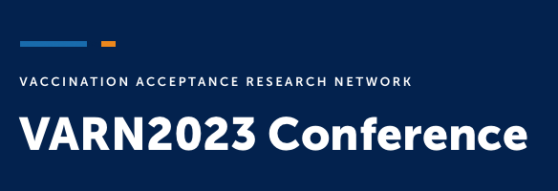Speakers
Index
Surani Abeyesekera
Sara Al-Dahir
Asma Ali
Raheel Allana
Edina Amponsah-Dacosta
Drevina Andarini
Katie Attwell
Melanie Abongo Awino
Sharon Barnhardt
Rabab Batool
Anant Bhan
Sabitri Bhatta
Viviane Bianco
Lucilla Blankenberg
Nick Boehman
Valentina Bollenback
Devi Leena Bose
Ana Bottallo
Sunitha Chandrasekhar
Angela Chaudhuri
Manojkumar Choudhary
Patricka Chulamokha
Naby Yaya Conté
John Cook
Djeneba Coulibaly-Traore
Margie Danchin
Joël Fabrice Djaha
Eve Dubé
Luisa Enria
Thiaba Fame
Daniela Da Costa Franco
Arnaud Gagneur
Bhakti Ghatole
Amaya Gillespie
Monica Berger González
Glenda Gray
Magid Al Gunaid
Anuradha Gupta
Saif ul Hadi
Emily Hoffman
Kate Hopkins
Julio Ichazo
Aamer Ikram
Chinedu Anthony Iwu
Marley Jurgensmeyer
Richard Kabanda
Patrick Kahondwa
Charles Kakaire
Chrys Kaniki
Robert Kanwagi
Abdul Momin Kazi
Stacey Knobler
Yulianto Santoso Kurniawan
Furaha Kyesi
Heather Lanthorn
Heidi Larson
Julie Leask
Chelsey Lepage
Gloria Lihemo
Rupali Limaye
Porcia Manandhar
Stefan Mandić-Rajčević
Emily Miller
Mohamed Modber
Susanne Montgomery
Corrina Moucheraud
Raveesha Mugali
Zia Muneer
Kiranmayee Muralidhar
Lillyan Mutua
Sangwe Clovis Nchinjoh
Chattiya Nitpolprasert
Doris Njomo
Dumisile Nkosi
Chisom Obi-Jeff
Isaac Olufadewa
Hinda Omar
Saad Omer
Mofeyisara Omobowale
Suman Pant
Nadia Peimbert-Rappaport
Deepa Risal Pokharel
Carla Puca
Farah Qamar
Rubina Qasim
Mark Reñosa
Nessa Ryan
Lili Nur Indah Sari
Holly Seale
Saransh Sharma
Sneha Shashidhara
Mpho Z. Shelile
Jaya Shreedhar
Linda Shuro
Prem Singh
Yatender Singh
Laura Skrip
Joe Smyser
Theresa Sommers
Jacquellyn Ssanyu
Claire Thomas
Mavuto Thomas
Angus Thomson
Frisca Tobing
Carla Toko
Doreen Tuhebwe
Chizoba Wonodi
Tahir Yousafzai
Raluca Zaharia
Speaker Bios
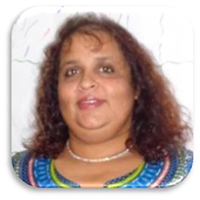
Surani Abeyesekera, MA
Surani Abeyesekera is a communication practitioner with over 23 years’ experience in Social and Behaviour Change Communication with the UN and a further 5 years’ experience in the field of advertising with two of the largest advertising agencies in the world. She has worked in UNICEF offices in Sri Lanka, the Pacific based in Fiji, Bangladesh, Nigeria, Ghana, Somalia, Kenya and also briefly in Indonesia with FAO in 2008. She is now based in New York with UNICEF Head Quarters. Prior to joining UNICEF, Surani had over 5 years of experience working in two global communications agencies. McCann Erickson and J. Walter Thompson, (JWT). Surani is passionate about her work around behaviour and social change and has years of experience in working in emergency as well as development contexts over the past 23 years. She now supports the Immunisation Demand team at UNICEF HQ, as a Social and Behaviour Change Specialist. She supports the work on global vaccine demand and addressing vaccine hesitancy. She leads the related to social listening and infodemic management for UNICEF. Surani also now chairs the Digital Information Environment workstream of the Vaccination Demand Hub. Surani also leads the work around capacity building to increase demand for immunisation while also supporting other routine immunisation related interventions for UNICEF. Surani holds a bachelor’s degree in Marketing and Communication, and a master’s in digital communications. Surani has co-authored several papers related to vaccine demand and related fields over the last several years.
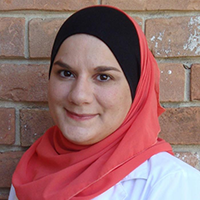
Sara Al-Dahir, PharmD, PhD, MPH, BSc
Dr. Al-Dahir has completed her BSc and MPH from Tulane University, PharmD from Xavier University and PhD in International Health from Johns Hopkins University. She has published on vaccine access and equity, Infectious Disease, Critical Care, and International Health, specifically vaccine uptake among children in conflict areas. Dr. Al-Dahir is focused on the issues of vaccine equity and the disproportionate impact of infectious syndromes on marginalized communities and individuals from disadvantaged backgrounds. Dr. Al-Dahir has conducts research and serves as a consultant for UNICEF (United Nations Children’s Fund). She has presented nationally and internationally on issues related to vaccine equity. She is currently the lead investigator on multiple NIH grants on health disparities and vaccine equity as well has received funding from Pfizer© and Roche-Genentech©. Dr. Al-Dahir has published in the Lancet Global, BMJ Global, BMJ Open, American Journal of Public Health, AJPE and several pharmacy, infectious diseases and health disparities journals.
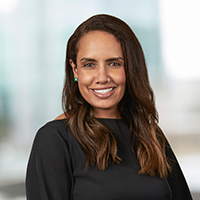
Asma Ali, MD
Asma Ali is a medical doctor and an expert in fragile health systems and emergency response with over 15 years of national and international experience. She had worked with the Kenya Ministry of Health, the Médecins Sans Frontières (MSF) and the World Health organisation in Kenya , Sierra Leone, Afghanistan , Mozambique , Pakistan and Somalia . Currently Asma works as a senior program officer for the Polio Outbreaks at the Bill & Melinda Gates Foundation and leads the work in Somalia and Yemen. Asma is passionate about rights-based approaches to emergency response and currently working to understand better how to apply a Diversity, Equity and Inclusion framework to tackle the problem of Zero-dose and under-immunisation of children.
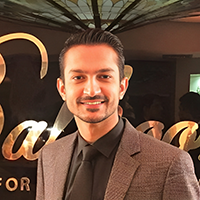
Raheel Allana, MSBE, BDS
Dr. Raheel Allana is a highly dedicated and accomplished early-stage public health researcher. He has a background in dental surgery and a Masters in Epidemiology & Bio-statistics, and has been actively involved in public health research since 2019. He has worked on research studies focused on vaccine preventable diseases and digital health, and has played important roles in quantitative data analyses, manuscript writing and proposal submission. Currently, Raheel is part of a quantitative team analyzing data for a study on community-based RSV mortality in Karachi, Pakistan, which is funded through Bill and Melinda Gates Foundation and is also looking at a quantitative part of a project titled “Profiling of Social Mixing Patterns in Pakistan,” which is funded through RO1 – NIH. In addition to his research work, he has published 13 articles indexed in PubMed, with an h-index of 7. Raheel is also involved in editorial work, serving as an Academic editor for PLOS One journal and reviewing for multiple international indexed journals including BMC Oral Health, Journal of Epidemiology & Global Health, JMIR etc. Overall, he has a strong foundation of skills and experiences in public health research and is actively engaged in contributing to the field.
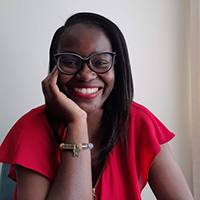
Edina Amponsah-Dacosta, PhD,MPH
Dr Edina Amponsah-Dacosta is a Postdoctoral Research Fellow at VACFA. She is a trained Medical Virologist, and obtained her PhD in Medical Virology from the Sefako Makgatho Health Sciences University in 2017. Her postgraduate research was in the field of viral hepatitis, with a particular focus on the impact of universal hepatitis B vaccination in South Africa, and the molecular genetics of the hepatitis B virus. After her PhD, Edina took up a Masters in Public Health (MPH) at the University of Cape Town, specializing in Health Policy and Systems. Her MPH research focus is on the interaction between national immunization programs and the broader health systems in which they are embedded. In 2018, Edina joined VACFA as an avenue to marry her infectious diseases and public health backgrounds in pursuing her research goal of reducing the burden of vaccine-preventable diseases across the African region. She is currently working on a research project aimed at designing alternative, optimal vaccination strategies against pertussis. For this purpose, her research will look to characterize the immune response following homologous and heterologous prime-boost vaccination strategies against pertussis in South African children and adolescents. During her tenure as a fellow, Edina is also involved in conducting systematic reviews, co-supervising postgraduate students and co-organizing the annual African Vaccinology Course hosted by VACFA. She works closely with her principle investigator, Dr Benjamin Kagina, as well as with Dr Rudzani Muloiwa and Prof Gregory Hussey.
Drevina Andarini
Drevina Andarini is a communication professional who has been working at the intersection of health, gender, and youth for more than 6 years. She currently serves to build more effective and efficient health communication, as well as support the advocacies for more inclusive health promotion and better access to health services at the Australia Indonesia Health Security Partnership (AIHSP), a program to enhance Indonesia's health security and protecting against future pandemics by adopting an approach that integrates human, animal, and wildlife health. Her past work portfolio is working across international development projects and agencies including donor projects from DFAT, and USAID, to the UN agency. Her area of expertise includes health & social behavior change communication, communication, media, and knowledge management.
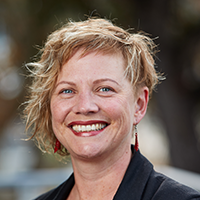
Katie Attwell, PhD
Associate Professor Katie Attwell is a political science and public policy scholar at the University of Western Australia, where she leads VaxPolLab. She is an Honorary Fellow of the Wesfarmers Centre of Vaccines and Infectious Diseases at Telethon Kids Institute and the current Chair of the Collaboration on Social Science and Immunisation (COSSI), a national network of vaccination social science researchers. Katie is a global expert in vaccine hesitancy and vaccination policies for childhood and COVID-19. She has engaged in community, policy, and behavioural research in vaccination uptake since 2014, the year of her ground-breaking and internationally recognised “I Immunise” campaign, which drew on behavioural insights to address alternative lifestyle-based vaccine hesitancy. Her recent Discovery Early Career Researcher Award (2019-2022), a three-year research fellowship funded by the Australian Research Council of the Australian Government, explored mandatory childhood vaccination policies in Australia, Italy, France and California. Katie led the interdisciplinary West Australian project “Coronavax: Preparing Community and Government”, which engaged in community and government research for the COVID-19 vaccine roll-out, funded by Wesfarmers and the Health Department of Western Australia. From 2023, Katie leads MandEval, a mixed methods and multi-country study of the implementation and impact of COVID-19 vaccine mandates.
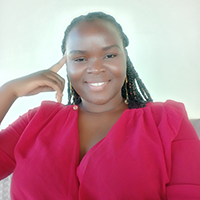
Melanie Abongo Awino, PhD, MPH
Melanie Abongo Awino is the Project Manager and Research Officer for SSI study at Kenyatta National Hospital and a passionate Researcher. Over 6 years she has conducted research and published 5 articles as a primary author and 2 as a secondary author. She has just enrolled for a PhD-PH program at the Kenya Medical Research Institute. Melanie continues to progress in the field of research with an aim of even higher success. Melanie developed interest in research as a young researcher and has had revolutionary rounds of mentorship through the last 8 years. She has gained expertise in writing award-winning proposals, project proposal reports, case summaries and series and project management skills.
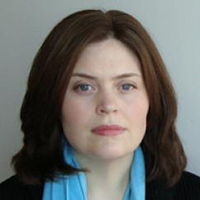
Sharon Barnhardt, PhD, MPA
Sharon Barnhardt is the Director – Research at the Centre for Social and Behavioural Change at Ashoka University. Her research focuses on issues of urban development and rural health in India, through the use of natural and randomized evaluations. She is currently conducting an evaluation to improve the sustainability of community sanitation in urban Odisha and estimating the impact of selling iron-fortified iodized salt on anemia in women, men, and children in rural Bihar. Her earlier research studies the impact of government housing programs on economic mobility, inter-religious attitudes, and social networks. Her research is funded by the Bill & Melinda Gates Foundation, 3ie, the UK's Foreign, Commonwealth and Development Office (formerly DFID), and the US National Institutes of Health. Prior to CESS, she was an Assistant Professor at the Indian Institute of Management Ahmedabad. Sharon is also an affiliate of the Institute for the Study of Labor (IZA). Sharon earned her PhD from Harvard University and also holds an MPA from Princeton University.

Rabab Batool, PhDc
Rabab Batool is a researcher, Epidemiologist, and Ph.D. candidate (University of Tampere) working with the Department of Pediatrics and Child Health at the Aga Khan University, Karachi, Pakistan. Her research focuses on Typhoid Conjugate Vaccine, Typhoid fever, strategies to increase vaccination coverage, maternal, newborn and child health, infectious diseases, and AMR.
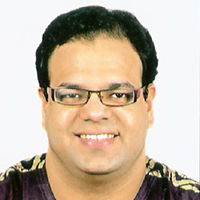
Anant Bhan, MBBS, MHSc
Mentor and Principal Investigator, Sangath. Anant Bhan, MBBS, MHSc, is a researcher in global health, health policy, bioethics and mental health with over 20 years of experience. Trained as a medical doctor from India and in bioethics from the University of Toronto, Anant currently leads/co-leads several research projects in the areas of global mental health, health equity, participatory research and community engagement. Anant also serves as a mentor for the Bhopal Hub of Sangath, a public health research organization. In addition, Anant serves in several institutional ethics committees and teaches bioethics in Yenepoya University (Fogarty International Centre), Manipal Academy of Higher Education, and at some of the All India Institutes of Medical Sciences. Anant is also very active in engaging with news media and social media.
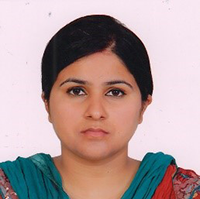
Sabitri Bhatta, MA
Sabitri Bhatta is a registered nurse and has knowledge of Demography and Gerontology. She has a career spanning from about 6 years in the development field and 3 years in the academic area. She has held entry level to mid-level positions. Also, her Masters in Population and Social Gerontology have exposed her to concepts of social security systems, theories of aging and advances in the social aging sector. In addition, Sabitri is well versed in substantive as well as analytical demographical tools that have supported her in making research inferences in broader aspects of population. She was engaged with esteemed organizations such as Save the Children, Care Nepal and Abt Associates Inc. in areas of maternal, neonatal, child health, vaccination, and emergency response. The field level exposure during her professional journey has established her as an advocate for mainstreaming of need from hard-to-reach areas and people living with disabilities. This has shaped her interests in managing projects relating to emergencies, child, neonatal and maternal health. Sabitri strives to manage sustainable programs for delivering tangible program results. She is establishing herself as a researcher in similar fields and has presented her papers in national as well as international conferences.
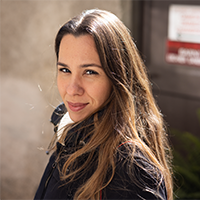
Viviane Bianco, MSGH, MBA
Viviane Bianco is a Social and Behaviour Change Specialist with the UNICEF Regional Office for Europe and Central. She provides technical advice, guidance, and support to 22 country offices in the region to help them increase vaccine demand and uptake. Her work on immunization focuses on supporting countries to conduct behavioural insights research and conduct social listening to identify the drivers and barriers to vaccine uptake and apply the insights to develop evidence-based solutions to increase the demand for vaccines. Viviane Bianco is a national of Brazil. She holds a bachelor's in Social communication, an MBA in Marketing, and a Master of Science in Global Health.
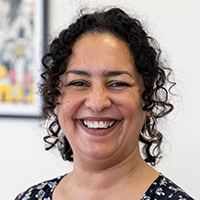
Lucilla Blankenberg
Lucilla Blankenberg spearheads Community Media Trust’s (CMT) creative campaigns, overseeing all aspects of development, production, post-production, and delivery of products. She is also responsible for good governance at CMT. Her accolades include a SAFTA (South African Film and Television Award) for best directing and best TV Comedy, alongside Laddie Bosch, for CMT’s TV show The Riviera, and an award for Best TV Series at the Zanzibar International Film Festival in 2018 for CMT’s drama series JAB, which she directed, produced and created. A Country For My Daughter, which Lucilla directed, received an award for Best Documentary at the 4th Gender and Media Awards in 2010. She has also worked as a director, editor and/or producer on several documentaries and films. Lucilla headed up CMT’s involvement in the highly successful Covid awareness and vaccine confidence campaign, Zwakala. She also oversaw the writing of the second season of The Riviera in 2022.
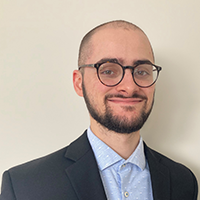
Nick Boehman, BA
Nick Boehman is an Associate with Sabin’s Vaccine Acceptance & Demand Initiative. Nick provides programmatic support and assists with communication and research needs across the VAD team. Prior to joining Sabin, Nick worked as a Program Associate with CGFNS International, a global health NGO, in a role that was highly research and reporting focused. Prior to that, he interned with the International Campaign to Abolish Nuclear Weapons (ICAN) in Austria. He earned his BA in International Relations from Saint Joseph’s University in Philadelphia.

Valentina Bollenback, BA
Valentina Bollenback is MAGENTA's Asia Regional Programme Director. Over the last decade, she has designed, developed and disseminated communications and SBC programmes with Save the Children, UNICEF, the UK Government and MAGENTA with a particular focus on development and humanitarian contexts. As a strategic communications and behaviour change campaigns specialist, Valentina's work has ranged from supporting the Tunisian Ministry of Health throughout the COVID-19 pandemic to increase vaccine uptake, supporting the former Government of Afghanistan to counter Taliban disinformation and promoting healthy practices in East Africa. She is based in Amman, Jordan.
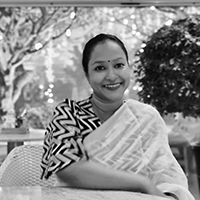
Devi Leena Bose, MA
Devi Leena Bose leads Behavioural Change and Communications for India and South Asia at Kantar Public. She has worked across various public and non-profit sectors to understand behavioural challenges and to provide behavioural solutions for a wide variety of public health issues. Before joining Kantar, Devi Leena was working with IAVI where she led the design, advocacy and on-ground implementation of strategies that promote communicative justice and enable community trust and ownership in public health programs and prevention research. She leveraged her interdisciplinary training in human-centered design, participatory research and public policy to design research to understand the complexities of human behavior across varying contexts, and develop social and behavior change communication strategies that support the mainstreaming and equitable engagement of marginalized communities in healthcare.
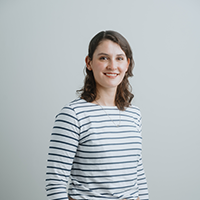
Ana Bottallo, PhD
Ana Bottallo is a biologist with an M.Sc. in Zoology from the University of Sao Paulo, Brazil, and a combined Ph.D. in Zoology and Paleontology from the Muséum National d'Histoire Naturelle in Paris. Based in São Paulo, Brazil, Ana reports on science and health for Folha de S.Paulo since 2020. During this time, she has published extensively on environmental, scientific, and health topics, especially during the coverage of the COVID-19 pandemic, with over 600 articles published so far. Her 5 most-read articles have reached nearly half a million page views each and focused on providing the public with scientific information about COVID-19 vaccines and the importance of following health measures. In 2022, Ana was recognized with the 1st InfoVacina Journalism Award in the "Explanatory and Service" category for her story about how mRNA technology could benefit the development of vaccines against neglected diseases. She was also a finalist for the "Most Admired Science, Well-Being, and Health Reporters of Brazil" award from the Albert Einstein Israelite Hospital. Ana's coverage of the COVID-19 pandemic received an honorable mention from the Communications Portal in 2021.
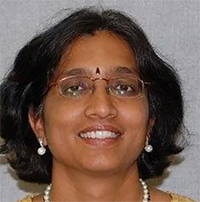
Sunitha Chandrasekhar, PhD
Sunitha Chandrasekhar Srinivas is committed to community-led health systems strengthening. She has international experience in community co-creation and service leadership for health promotion. Research, advocacy and teaching remained a foundational aspect in her career. Her work spans nearly three decades and has always been aligned with health objectives. She has led and participated in projects funded by the World Health Organisation, the World Bank, the Bill and Melinda Gates Foundation, and, recently, JHPIEGO (John Hopkins affiliate) through USAID-Reaching Impact, Saturation, and Epidemic Control (RISE). Her research interests include maternal and child health, disease prevention and health promotion for non-communicable diseases, Antimicrobial Stewardship, HIV/AIDS, TB, pandemic preparedness and post vaccination safety surveillance. Sunitha is now focused on international collaboration for zero dose vaccination.
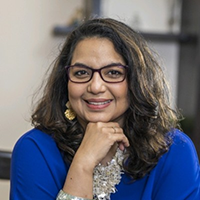
Angela Chaudhuri, MPH, BDS
Angela Chaudhuri has over 23 years of experience in public health in India and internationally. She is the Chief Catalyst at Swasti, the ‘health catalyst” under the Catalyst Group of organizations headquartered in Bengaluru, India. From evaluation of several countries’ national HIV programs to research, capacity building and knowledge management, Angela works closely with governments, civil society, community groups and corporations. She has led teams to help countries raise close to a billion dollars towards HIV, TB, Malaria, Health Systems Strengthening and Community Systems Strengthening, and she continues to support governments with poor health outcomes, to help strengthen their systems of information, human resource management, program design and planning. She has globally co-designed interventions and helped raise more than 1.3 billion USD for TB, HIV, Malaria for 12 countries. Through COVID Action Collab, she led her team to reach 15 million invisible marginalized people with COVID vaccination. She has a Bachelor’s Degree in Dental Sciences (Bangalore University), Masters in Public Health (Boston University) and PG Diploma in Journalism (London School). She has lived in five countries and worked in over 26 countries and most of India. She currently serves on the board of the Catalyst Group of Institutions, IDEX Global Accelerator, AIDS Society of Asia and Pacific. She has previously served on Partnership of Maternal Newborn and Child Health (PMNCH) a global alliance hosted by the World Health Organization. She is a part of MIT Solve Leadership group and in the Social Participation Technical Network hosted by the WHO. She has been with Swasti since its inception in 2004 and is responsible for its growth and trajectory. Swasti (Wellbeing in Sanskrit) is a Global South civil society organization that is committed to adding 100 million ‘well’thy days for vulnerable communities. Swasti works to elevate the discourse from health to well-being and join the missing pieces in wellness together (social, behavioural, management and technology) around the technical/medical aspects, with a strong focus on prevention and promotion. Swasti’s multidisciplinary teams do two things well - 1. Demonstrate scalable, cost effective and sustainable models in partnership with communities 2. Support partners to reach impact.
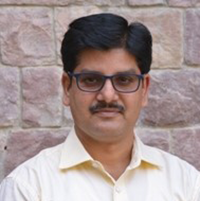
Manojkumar Choudhary, PhD, MPS
Manojkumar Choudhary is a trained demographer and Ph.D. in Public health, having 24 years of work experience in community health programs in India. He has worked both at the grassroots as well as managerial levels for various international organizations. He is a published author experienced in community-based social and health research and has applied various behavioral research tools and techniques for developing program communication strategies. Since 2011, he has been associated with the CORE Group Polio Project in India as the Monitoring and Evaluation specialist.

Patricka Chulamokha, MA, MPH
Patricka Chulamokha is a social scientist and public health specialist, with thematic background in humanitarian assistance, health systems, social protection, political science and health in limited resource setting and conflict areas. Prior to the pandemic she conducted a digital ethnographic study on vaccine acceptance and hesitancy among Thai online discussion platforms. While working as technical officer for the emergency response at WHO Thailand, Patricka initiated infodemic management response team consisting of governmental counterparts and other UN agencies to apply big data analytics and social listening tools for the design of national COVID-19 vaccine communications strategies. A fellow of Social Science in Humanitarian Action Programme. She is currently working as Regional Vaccination Support Office for International Organization for Migration, Asia Pacific Regional Office, and is a technical lead for the Vaccine Demand and Confidence initiative that working closely with the refugee population, applies rapid qualitative inquiries and Human-centered approach to public health intervention design. Her current area of focus under this initiative includes Refugees fleeing from the conflict from Myanmar that resides in temporary shelters along the border of Thailand-Myanmar, Ukrainian citizens fleeing from War in Chisinau, Moldova, and Poland.
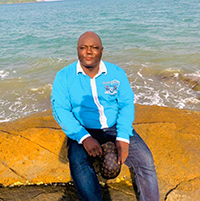
Naby Yaya Conté, MD, MPH
Dr Naby Yaya Conté is a medical doctor and holds a master's degree in Epidemiology of Intervention and Disease Control and an inter-university diploma in vaccinology. He is currently a consultant for the World Health Organisation in Guinea within the framework of the catch-up of zero-dose and under-immunised children deployed in the health district of Siguiri in Guinea. As part of his master's thesis, he completed internships at the clinical research unit in Nanoro and at the MURAZ Centre in Burkina Faso in 2022. In 2020 epidemiologist in the fight against coronavirus disease in Guinea. From 2017 to 2020 he was a study officer in the monitoring, evaluation and research section of the expanded programme on immunisation in Guinea. From 2013 to 2016 he was an immersion trainee at the Maferinyah Rural Health Training and Research Centre in Guinea in the field of primary health care. He now has 8 years of experience in practical immunisation activities.
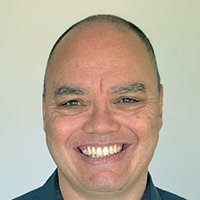
John Cook, PhD
John Cook is a Senior Research Fellow with the Melbourne Centre for Behaviour Change at the University of Melbourne, researching how to use critical thinking to counter misinformation. He obtained his PhD in cognitive science with the University of Western Australia, researching inoculation strategies to neutralise science misinformation. In 2007, he founded Skeptical Science, a website that won the 2011 Australia Museum Eureka Prize for the Advancement of Climate Change Knowledge. In 2013, he published an award-winning paper quantifying the 97% scientific consensus on climate change which was highlighted by President Obama and UK Prime Minister David Cameron. In 2015 at the University of Queensland, he led the development of a Massive Open Online Course on climate science denial that has received 40,000+ enrollments from over 185 countries. He co-authored the college textbooks Climate Change: Examining the Facts and Climate Change Science: A Modern Synthesis, as well as the book Climate Change Denial: Heads in the Sand. He wrote and drew the cartoons in the book Cranky Uncle vs. Climate Change, followed by development of the Cranky Uncle game, which combines critical thinking, cartoons, and gamification to build resilience against misinformation. He currently works with organisations such as Facebook, NASA, the Sabin Vaccine Institute, and UNICEF to develop evidence-based responses to misinformation.
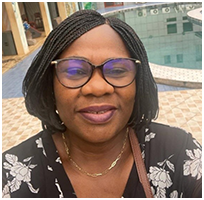
Djeneba Coulibaly-Traore, PhD, MPH
Dr Djeneba Coulibaly-Traore is the Project Director of a USAID funded project Momentum for Routine Immunization Transformation and Equity (M-RITE). She has more than 20 years of experience in the Public Health field, with a PhD in Sociology from the University of Cote d'Ivoire and a MPH in Public Health from University of Berkeley. In her role as the Project Director, Dr. Coulibaly-Traore oversees project activities in the COVID-19 vaccination program, routine immunization, data system strengthening, and demand generation and communication. Her previous work includes projects in immunization, global health security, HIV/AIDS, TB, and Malaria across a range of organizations (civil society organizations, government agencies, and donors including CDC, USAID, Institut de Recherche pour le Développement, and UNICEF. She has served in leadership roles as the Chief of Party of the CRS Guinea country program, for the Global Fund, and for the National Malaria Control Program. In her position, Dr. Coulibaly-Traore has provided leadership and supervision to operational components, mitigated financial and program risks, built institutional and partners’ capacities, and contributed to the implementation of complex public health and health systems programs.
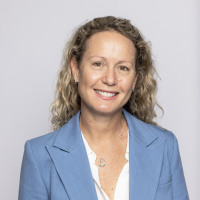
Margie Danchin, MBBS, PhD, FRACP
Group Leader, Vaccine Uptake, Murdoch Children's Research Institute. Paediatrician, Department of General Medicine, The Royal Children's Hospital. Professor and Clinician Scientist Fellow, Department of Paediatrics, The University of Melbourne. Director Clinician Scientist pathways, The University of Melbourne . Margie is a consultant paediatrician at the Royal Childrens Hospital and Clinician Scientist, University of Melbourne, and Murdoch Childrens Research Institute (MCRI). As leader of the Vaccine Uptake Group, MCRI, her research focuses on vaccine confidence and uptake, particularly amongst high risk-groups and in low and middle-income countries, and on effective risk communication. In Australia, she is chair of the Social Science Advisory Board and a member of the Scientific Advisory Committee, National Centre for Immunisation Research and Surveillance (NCIRS) and is an expert advisor to the Australian Technical Advisory Group on Immunisation (ATAGI). She is committed to efforts to improve vaccine confidence and uptake in the Asia Pacific Region, and works closely with DFAT to provide technical immunisation support for the region. She is Deputy chair, Australian Regional Immunisation Alliance (ARIA) and is on the Australian Expert Technical Assistance Program for Regional COVID-19 Vaccine Access: Policy, Planning and Implementation (AETAP-PPI) Advisory Board. She is on the steering committee for the MCRI COVID Governance Committee and Melbourne Children’s Global Health.
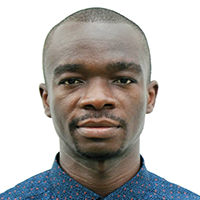
Joël Fabrice Djaha, MPH
Joël Fabrice Djaha is a doctoral student in sociology at the Université Félix Houphouët-Boigny in Abidjan, Côte d'Ivoire, and is also a qualitative research assistant at the PAC-CI Program's social sciences division. He conducts research on infox and polemics about Covid-19 in Facebook virtual communities at the Groupe de Recherches en Socio-Anthropologie appliquées à la santé et au Vieillissement. Joël is particularly interested in themes related to health, politics in Ivorian cyberspace, methodological approaches and ethical considerations related to virtual community studies. An infodemic manager, ICT and photography enthusiast, Joël is interested in various forms of knowledge transfer including video and policy briefs.
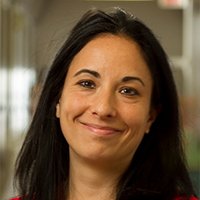
Eve Dubé, PhD
Eve Dubé is a medical anthropologist. She is affiliated with Quebec National Institute of Public Health in Quebec, Canada. She is a research scientist at the Research Center of the CHU-Québec and an invited professor in the Department of Anthropology at Laval University. Her research program focuses on the sociocultural determinants of vaccination. She is the lead investigator of the Social Sciences and Humanities Network of the Canadian Immunization Research Network. She is interested in how to enhance vaccine acceptance and uptake and she is leading different projects around this issue. She sits on a number of committees as an expert on vaccine acceptance and hesitancy. She was a member of the World Health Organization working group on vaccine hesitancy.
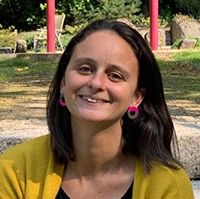
Luisa Enria, PhD
Luisa Enria is Assistant Professor in Anthropology at the London School of Hygiene & Tropical Medicine. Her work explores community knowledge and experience in health emergencies and the challenges and possibilities of interdisciplinary collaborations in epidemic response. She has worked in the Ebola vaccine trials in Sierra Leone, studying local experiences of the novel vaccine and integrating social science findings in clinical operations and community engagement. With funding from the Sabin Vaccine Institute, she co-developed a training package with the Kambia District Health Management Team for Community Health Workers to conduct ethnographic research on vaccine confidence in border communities and ran participatory analysis workshops to redesign the District community engagement strategy. She is the director and producer of a documentary on community involvement in emergency response and she holds a UKRI Future Leaders Fellowship for a project on the politics of knowledge in epidemic preparedness. In 2023 she was awarded funding from the UK Humanitarian Innovation Hub for a project co-led with Karl Blanchet at the University of Geneva and in partnership with the IFRC to evaluate community engagement for emergency vaccine deployment in crisis settings.
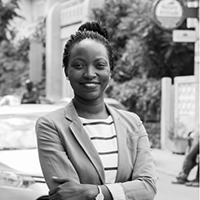
Thiaba Fame, MPH
Thiaba Fame is a Community Engagement and Accountability (CEA) specialist with a demonstrated history of implementing projects in challenging environments. She has an extensive background in community mobilization, qualitative assessments, as well as program framework for community outreach activities in humanitarian operations. Previously, Thiaba worked as a RCCE expert with UN IOM and Doctors Without Borders (MSF) for several years in fragile and complex settings. She is one of the co curator of the first bilingual online library for RCCE material for Covid-19 response for the West African regional technical working group. She is also engaged in various social science projects in the area of vaccines uptake, including the WHO Advisory Committee on Vaccine Safety (AACVS).
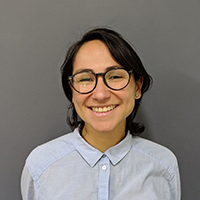
Daniela Da Costa Franco, MSc
Daniela Da’Costa Franco is a young early-career researchers from Guatemala. She has a master in social-epidemiology from University College London (2019-2020), with a strong background on surveillance systems and health implementation at primary healthcare. She has worked with surveillance systems for the COVID-19 response; digital health implementation; health promotion interventions with a culturally pertinent and transdisciplinary approach; behavior health analysis through the adherence to preventive and mitigation measures of COVID-19 and COVID-19 vaccination. She also has experience in medical entomology, mainly with malaria vectors understanding the development of insecticide resistance, mosquito rearing, and freshwater entomology monitoring systems. In 2021 she collaborated in the “Rapid Ethnographic Assessment of Factors Influencing Vaccination against COVID-19”, a nationwide cross-sectional survey commissioned by the Ministry of Health and the Pan-American Health Organization aimed to inform the COVID-19 vaccine promotion campaign. Currently a researcher guest of the Unit of Medical Anthropology, of the Center for Health Studies in Guatemala, and part of the Institute of Inclusive Health. Her main interest is to contribute to build the most appropriate surveillance systems for resource limited settings, and transfer the necessary skills to healthcare workers to promote evidence based decisions.
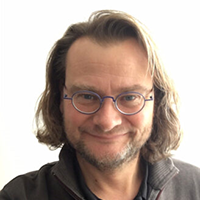
Arnaud Gagneur, MD, PhD
Arnaud Gagneur, MD, PhD, trained in Pediatrics and Neonatology at the University of Brest, France received his PhD in Virology at the University of Brest, and is a full professor at the Faculty of Medicine and Health Sciences of the University of Sherbrooke. He is affiliated with the CIUSSS de l'Estrie - CHUS Research Center (Senior Clinician-Scientist FQRS- Quebec Research Funds-Health). He has developed and validated the concept of promoting vaccination in maternity hospitals to parents using MI techniques, the PromoVac strategy, in a pilot study in the Eastern Townships and in randomized controlled trials (RCTs) conducted in Quebec and Canada. In collaboration with the Quebec Ministry of Health, he participated in the implementation of the PromoVac strategy as a provincial public health program, the EMMIE program, and conducted its evaluation. In addition, A. Gagneur's research team developed a training on MI applied to vaccination for health professionals and developed the evaluation tool for this training. He is also developing training on the MI approach to immunization for health care workers in collaboration with UNICEF, US CDC and Santé Publique France.
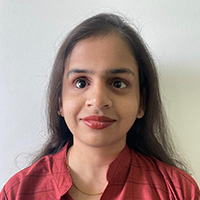
Bhakti Ghatole, MSAP
Bhakti Ghatole works as a Research Assistant at the initiative for Health Equity Advocacy and Research (iHEAR) at Sangath India. Her work is informed by equitable, intersectional and participatory research approach. She also works as a mental health professional and practices as a Queer and disability-affirmative, trauma-informed and narrative-therapy practitioner. She was a gold medallist in economics and political science during graduation. Later, she got her masters in applied psychology and is currently pursuing her second master’s in counselling social work. Bhakti's goal is to use her own experience of being visually impaired, and work for the empowerment of persons with disability and other marginalized communities. She firmly believes that every individual has the right to exist, experiment and experience the intricacies of human life.
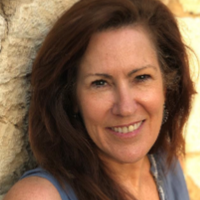
Amaya Gillespie, PhD
Dr. Amaya Gillespie is an experienced researcher and change strategist, having earned a PhD in behavioral science. She has held a range of senior leadership roles in international organisations. She has a strong public health background with more than 20 years’ experience in the design of ‘human’-centred solutions to address the world’s toughest public health problems. She has led global, regional and national initiatives, including in emergencies (e.g., Ebola, Zika, HIV) and most recently, the regional response to COVID-19 in UNICEF’s Middle East and North Africa Region. Amaya is highly skilled at integrating evidence from various disciplines, with unique expertise in addressing complex challenges at the intersection of systems and communities. Amaya holds Australian and Spanish nationalities.

Monica Berger González, PhD, MPH
Mónica Berger González is a sociocultural anthropologist from Guatemala with a PhD in Sciences from ETH Zürich. She heads the Unit of Medical Anthropology at the Center for Health Studies in Universidad del Valle de Guatemala and is an associate researcher of the Swiss Tropical and Public Health Institute in Basel. Her research is focused on intercultural transdisciplinary processes to address plurimedical systems in inequity, ethnomedicine of Mesoamerican populations, public health policy and its impact on indigenous groups, One Health approaches, among others.
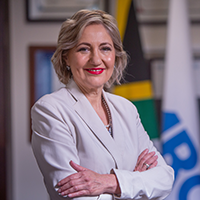
Glenda Gray, DSc, MBBCh, FCPaeds
An NRF A1 rated scientist, CEO and President of the South African Medical Research Council (SAMRC), Professor Glenda Gray is a qualified pediatrician and co-founder of the internationally recognised Perinatal HIV Research Unit in Soweto, South Africa. Prior to her appointment at the SAMRC, she was the Executive Director of the Perinatal HIV Research Unit, an affiliate of Wits University. Glenda’s global profile includes a role as Co-PI of the HIV Vaccine Trials Network (HVTN), an international collaboration for the development of HIV/AIDS prevention vaccines. As the COVID-19 pandemic developed, she was among the first to lead public discourse on the issue, and to move quickly to establish COVID-19 vaccine trials in South Africa, utilizing the experience and network developed over the years for the HIV vaccine work. Glenda served as a Protocol Co-Chair of the multi-country Ensemble Study investigating the single-dose Ad26.COV2.S vaccine as an emergency response intervention. When South Africa’s national vaccine roll-out faltered, her international stature enabled her to negotiate a donation of 500 000 doses of the Ad26.CoV.2 vaccine before any emergency use authorization was available and conduct a phase 3B open-label study in health care workers, called the Sisonke Study. She received South Africa’s highest honour – the Order of Mapungubwe - for her pioneering research in PMTCT. Other prestigious accolades include the Nelson Mandela Health and Human Rights Award for significant contributions in the field of mother-to-child transmission of HIV. Selected as one of Time’s 100 Most Influential People in the World, Forbes top 50 women in Africa, honorary degrees include: DSc (honoris causa Simon Fraser University), DSc (honoris causa Stellenbosch University), and LLD (honoris causa Rhodes University). She is a member of the National Academy of Medicine, the Academy of Science of South Africa, the African Academy of Science and the World Academy of Science. She is fellow of the American Academy of Microbiology. She is a member of the board of GARDP, AAHI and a member of the WHO TB-STAG.
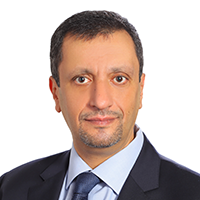
Magid Al Gunaid, MBBCH, MPA
Dr. Magid Al Gunaid, a medical doctor specialized in Health Systems Management and Public Administration. During the period 1996-1999, Dr Al Gunaid served as the District Health Director in Ibb governorate at the Ministry of Public Health and Population (MoPHP), Yemen. After that, he was assigned as the Director of Health Insurance, and then held the Director General position of the General Planning Directorate, then the Director General of Health Policy and Technical Support Unit until mid 2004. In June 2004, he was appointed as the Deputy Minister for Primary Health Care at the Ministry of Public Health and Population, Yemen. In 2016, he Joined the Global Health Development | Eastern Mediterranean Public Health Network (GHD|EMPHNET) as the Polio and Immunization Team leader then the Public Health Programs Director since March 2020. During the period of 2008-2011, Dr Al Gunaid was a board member with Gavi and the Global Fund where he was a member of the Program and Policy Committee. In addition, he was a member of the EMR Regional Technical Advisory Group for immunization between 2010 and 2015.
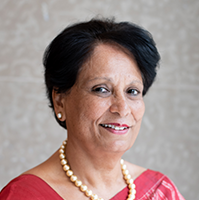
Anuradha Gupta, MBA
Anuradha Gupta is the President of Global Immunization at the Sabin Vaccine Institute. A veteran public health leader, Ms. Gupta has in her previous roles spearheaded a host of successful global initiatives to improve the health of women and children and harness the full power of vaccines. Her work has created profound impact at a global scale, saving and improving millions of lives. Prior to Sabin, Ms. Gupta spent several years at Gavi, The Vaccine Alliance, as its deputy CEO, where she pioneered the concept of zero-dose children – focusing on children who have not received even a single dose of the most basic vaccines. She also led efforts to roll out a new framework for a country-centric engagement immunization strategy with remarkable success. Before her time at Gavi, Anuradha served as Mission Director of the National Health Mission of India, where she ran the largest public health program in the world and played a leading role in the country’s efforts to eradicate polio, reduce maternal and child mortality, and revitalize primary health care. Anuradha holds a Master of Business Administration from the University of Wollongong in Australia and received executive education from the John F. Kennedy School of Government at Harvard University, the Stanford Graduate School of Business and the Maxwell School of Citizenship and Public Affairs at Syracuse University.
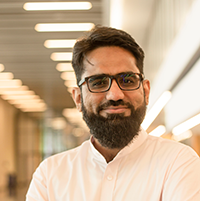
Saif ul Hadi, MA
Saif ul Hadi is Director – Global Access and Behavioral Research at IAVI in India, where he oversees policy research, market shaping, demand generation, community engagement and behavioral science projects towards enabling equitable access for life-saving innovations including vaccines and antibodies in India and other LMICs. Previously, he was Principal Consultant – Innovation at Sightsavers, and before that he was Manager – Employability Education and Rural Development at Medha. His interdisciplinary background in human behavior, health policy, persuasive communications and computer science has enabled him to lead complex, multidisciplinary interventions across a range of domains including HIV, TB, respiratory diseases, reproductive health, pandemic preparedness, non-communicable diseases, disability, and health education. Saif has successfully led the design and development of three suites of physical and digital games leveraging experiential learning strategies for influencing health behavior, vaccine uptake and research participation among vulnerable populations in India and eastern and southern Africa. He has played a key role in providing technical and management support to flagship global health initiatives including the India-Africa Health Sciences Collaboration, National Biopharma Mission, and National HIV Cohorts Program. He has also contributed to global discourses on biomedical research ethics and good participatory practices (GPP).
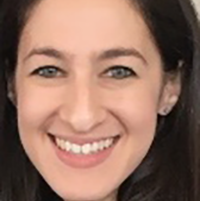
Emily Hoffman, MD
Dr. Emily Hoffman was born and raised in New York. She graduated from State University of New York Downstate College of Medicine in 2017. She did her Internal Medicine residency at Montefiore Medical Center from 2017-2020 and stayed an additional year as chief resident in 2021. Dr. Hoffman is passionate about community health education as well as medical education, and she was part of a Medical Education Pathway in both medical school and residency. She is now finishing her second year as an Infectious Disease fellow at New York University Grossman School of Medicine and will be staying on as faculty as a clinical Assistant Professor this upcoming academic year. She lives in New York with her husband and two children.
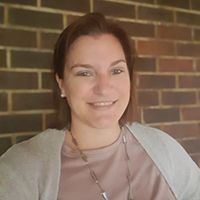
Kate Hopkins, PhD, MPH
Director of Research, Vaccine Acceptance & Demand. Dr. Kate Hopkins oversees research programming across the Vaccine Acceptance & Demand team to implement program activities, expand and manage partnerships, invest in new research projects and continue the growth of Sabin’s thought leadership programming. Prior to joining Sabin, Kate spent 11 years living and working in sub-Saharan Africa conducting infectious disease prevention and psychosocial-behavioral research and health service program implementation in low- and middle-income countries—with particular focus on high-risk and vulnerable populations. Managing multi-country and multidisciplinary teams, her past portfolio of work included supporting clinical research site operations and strengthening capacity for the conduct of HIV and COVID-19 vaccine clinical trials within the HIV Vaccine Trials Network and COVID-19 Prevention Network. Kate supported the implementation of the ENSEMBLE J&J Phase III clinical trial and the subsequent SISONKE J&J COVID-19 vaccination rollout amongst healthcare workers in South Africa. Kate has been a joint-Faculty Researcher for the Faculty of Health Sciences, University of the Witwatersrand in Johannesburg, South Africa, for nine years; and is a virtual course lecturer on Operational Research within a post-graduate diploma program in TB/HIV Management for the University of Cape Town in South Africa. She was awarded funding for her PhD study from the CDC as a PEPFAR-funded activity under its Cooperative Agreement with the South African Medical Research Council, earning her degree from the University of the Witwatersrand School of Public Health. She also holds a Masters in Public Health, with a focus on Global Health, from Boston University School of Public Health.
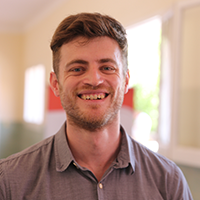
Julio Ichazo, MAppEc
Julio has a degree in Sociology from the University of Buenos Aires and a Master's Degree in Applied Economics from the Torcuato Di Tella University. Currently, he works as a Project Coordinator at the Bunge and Born Foundation. In previous experiences, Julio worked at the public sector as responsible for impact evaluation, at the National Ministry of Culture, and also at the Buenos Aires city Government. Julio is part of the Social Innovation department at Bunge and Born Foundation, and leads projects related to early childhood, rural education and health. In the early childhood area, he was team leader and responsible for the impact evaluation of “Crianza en Red”, a communication campaign that was designed to convey very easy to understand parenting guidelines. The information was sent to the families through WhatsApp following the principles of behavioral science. Nowadays Julio is team leader of the Vaccine Confidence and Access Index in Argentina, a periodic national survey that monitors the confidence and Access levels to vaccines of the general population.
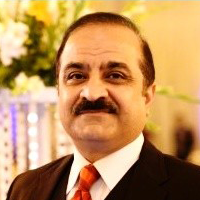
Aamer Ikram, PhD, MCPS
Prof. Aamer Ikram is Chief Executive Officer of National Institutes of Health Pakistan. Holds multiple national and international portfolios including: Chair Advisory Board TEPHINET; Chair Board of Directors IFBA; member Board Gavi, The Vaccine Alliance; Executive Board IANPHI; Executive Committee Institute of Safety in Technology & Research, UK; Technical Advisory Group – Biosafety, WHO; adjunct faculty Emory University; Ex-Executive Council of International Society for Infectious Diseases; and Co-Chair Biological Sciences Committee, Higher Education Commission; and member multiple National Working Groups. Have extensive experience of working with International Health Regulations, Global Health Security Agenda, Integrated Disease Surveillance & Response, One-Heath, Biosafety & Biosecurity, etc. achieving new standards for the country. Have been on forefront for the multiple deliveries against current COVID-19 scenario. Awarded FRCP by Royal College Edinburgh; FRCPath by Royal College of Pathologists London; and Fellowship in Public Health from Royal Colleges UK. He is a Fellow of Pakistan Academy of Sciences. Attained Registered Biosafety Professional (RBP) from American Biological Safety Association, Biosafety Professional from Institute of Safety in Technology & Research. Actively engaged in academics and research.
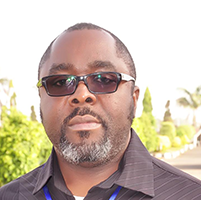
Chinedu Anthony Iwu, MBBS, MPH, MBA
Dr. Chinedu Anthony Iwu is a Consultant Public and Community Health Physician with Imo State University and teaching hospital; a Fellow of the West African College of Physicians. He has been a trainer/facilitator for the World Health Organization in the area of Infection, Prevention, and Control for Health Care Workers in Imo State. Also, an external reviewer and evaluator for World Health Organization’s manuscripts on best practices in polio eradication initiatives and other health interventions in Nigeria. He has served as a National Supervisor for the Measles Vaccination Campaigns in Imo State and has authored over 50 Research Publications in different areas of public health. He has been involved with policy decisions and public engagement in immunization activities and also, research activities in vaccine distribution, vaccinations in hard-to-reach areas, vaccine hesitancy issues, immunization uptake and coverage strategies.
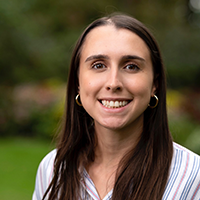
Marley Jurgensmeyer, MPH
Marley Jurgensmeyer has experience in research related to multiple vaccine and global health areas, including improving HPV vaccine introduction and access in low- and middle-income countries, monitoring COVID-19 vaccine effectiveness, and implementing accessible vaccine data visualizations. As a Research Associate at the International Vaccine Access Center at the Johns Hopkins Bloomberg School of Public Health, she works on the Coalition to Strengthen the HPV Immunization Community (CHIC) project, which aims to accelerate progress in HPV vaccine introduction, access, and program optimization in Gavi-eligible countries. She also works on the HPV Vaccine Acceleration Program Partners Initiative (HAPPI) Consortium, and on VIEW-hub (view-hub.org), which is an online, interactive, map-based platform for visualizing data on vaccine use and impact. She received her Master of Public Health from the University of Vermont Larner College of Medicine.
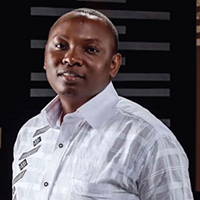
Richard Kabanda, MPH, MBA, PhD
Richard is a Public Health Specialist, and currently heads the Health Promotion, Education and Health Communication Department at Ministry of Health, Uganda. The department is charged with Planning, Implementation & coordination of Community Health Workers Programs in the country, Creating demand for vaccination and Immunization services on top of other Public Health interventions through Health Promotion and Disease Prevention approaches. Richard represents the 14 Eastern Africa countries to the Africa CDC Technical Committee on Community of Practice for Public Health Risk Communication & Community Engagement, where he is also a Co-Chair. Further, Dr. Kabanda chairs the Health and Gender committee for Buganda Kingdom; a Member to Allied Health Examinations Board; Community Advisory Board at Mildmay Uganda; and a member to Mubende Regional Referral Hospital Board. He holds a PhD in Public Health specializing in Health Promotion & Disease Prevention; a Master of Public Health – Health Promotion; and a Master of Business Administration from Uganda Martyrs University & University of South Wales, UK. He is a Fellow of Public Health at the African Institute of Public Health; and a Member of International Society for Global Health (M - ISoGH), Edinburgh, UK.

Patrick Kahondwa
Patrick Kahondwa is a science journalist from the Democratic Republic of the Congo, founder of the ScienceMediaRdc media. He works for Scidev.net and freelances for VaccinesWork. His reports focus mainly on environmental and health issues, with a particular emphasis on the topic of vaccination. As a journalist since 2011, Patrick Kahondwa worked at Radio Universitaire, a local radio station in the city of Bukavu, where he was in charge of programs and news for several years. After that, he worked as a journalist for Studio Hirondelle RDC, a project of the Hirondelle Foundation in the Democratic Republic of the Congo. He also worked for the international organization Internews as part of the AFIA AMANI Grands Lacs project, a project to combat rumors about vaccination against Covid-19. Active in science journalism since 2015, he helped create the network of science journalists in French-speaking Africa and organized the first-ever World Conference of Science Journalists.
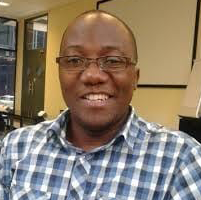
Charles Kakaire, MPH
Charles Kakaire is the Social and Behaviour Change Specialist in the Immunisation Demand section at UNICEF Headquarters in New York where he supports the roll out of human centered approaches, HPV vaccine communication and Interpersonal communication for immunisation. He also oversees the UNICEF Immunisation Demand engagement with Faith based Partners. Prior to this role, Charles worked with the UNICEF regional office for Eastern and Southern Africa overseeing the Risk communication and community engagement components of humanitarian and public health emergencies as well as the Johns Hopkins Center for Communication Programs on various regional projects. Charles holds a Master of Public Health/Social and Behavior Change Communication from University of Witwatersrand. He recently co-authored a Chapter in the Book - Communication and Community Engagement in Disease Outbreaks; Dealing with Rights, Culture, Complexity and Context
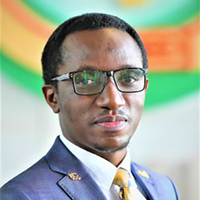
Chrys Kaniki, MD, PhDc
Medical Doctor by profession, Dr. Chrys Promesse K. Kaniki is an Africa CDC Public Health Analyst, PhD Candidate in Reproductive Health Sciences, and a Public Health Practitioner. He currently works in the Office of the Director General of the Africa Centres for Disease Control and Prevention as a Senior Technical Officer for Strategic Programmes and coordinate the Africa CDC AU Bingwa Initiative and the newly appointed Africa CDC Youth Advisory Team for Health. A passionate social and Public Health-oriented professional; driven to contribute to a better and more effective social, health and development policies and programs in Africa. Proactive in attaining set objectives in work environment, he is a competent individual with a passion for Youth inclusion and engagement, Sexual and Reproductive Health and Rights, Public Health Research, Communications & Information Systems and a career ambition of becoming a Public Health writer.
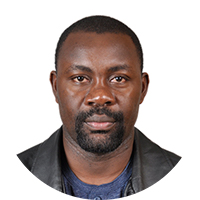
Robert Kanwagi, MPH
Robert Kanwagi is a Research Fellow for the VCP and leads projects in the Africa region, including the Africa Centres for Disease Control Working Group. He has a professional background as a social worker and public health professional and holds a master’s degree in Public Health. Robert is currently working with the international COVID-19 vaccine acceleration program COVAX, as well as being a member of GAVI’s Health Systems and Immunization Strengthening Team. He formerly worked with World Vision International as program coordinator of their Ebola vaccine project and with several of their other public health programs in Africa.
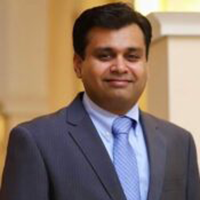
Abdul Momin Kazi, MBBS, MPH, PhDc
Momin Kazi is an Assistant Professor research, at the Aga Khan University Hospital. He is a physician (M.B.B.S in Dow Medical College, Pakistan), an epidemiologist (MSc. Vanderbilt University, TN USA) and is pursuing his PhD from the University of British Columbia, BC, Canada. Momin Kazi work focuses around digital/mobile health (mhealth) based interventions applying mixed methods and using technology as a tool in research studies to improve vaccination coverage and decrease vaccine hesitancy. Currently Momin Kazi is involved as an investigator with multiple research studies, and funded through NIH, BMGF, GAVI and GCC, to name few. He is also codirector of “Research Methods & Applications for Digital Health” course, offered to graduate students at AKU. His work interest also includes development and evaluation of esystems for real time visualization of data, geospatial analysis and development of auto generated systems including (SMS and automated calls), digital applications and AI and ML models for improving maternal and child health including vaccination coverage and hesitancy. He has published over 60 papers with h-index of 19 and heavily advocating on vaccine preventable diseases, and maternal child health in lower-middle income countries.
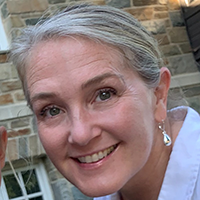
Stacey Knobler, MSc
Vice President, Vaccine Innovation & Global Immunization. Stacey Knobler has more than 20 years’ experience researching and developing programs and recommendations related to public health, the management of health systems, vaccines and vaccination. As VP, Vaccine Innovation & Global Immunization at Sabin, Stacey leads Sabin’s strategic planning efforts across organizational programming; convenes global experts to recommend strategies for accelerating and transforming vaccine development and delivery; assesses changing policies and practices across the vaccine development, regulatory and response landscape; and reviews how emerging technologies can benefit future vaccine development and delivery. With the Fogarty International Center at the U.S. National Institutes of Health, Stacey supported strategic planning and program direction for the Division on International Epidemiology and Population Studies, inclusive of the Malnutrition and Enteric Disease Study (MAL-ED), the Multinational Influenza Seasonal Mortality Study (MISMS), and training and capacity-strengthening initiatives focused on bioinformatics and phylogenetics, epidemiological modeling and data analytics, and biosafety and biosecurity systems in Sub-Saharan Africa, South Asia, Latin America, and the Middle East. At the National Academy of Sciences Institute of Medicine (NAM), she was the founding director of the Forum on Emerging Infections, led multiple projects to establish global public health priorities—including the scale-up of antiretroviral treatments and neurological and psychiatric disorders—and she developed a partnership effort between the National Academies and 8 African Academies of Science (ASADI). Stacey has published over 45 peer-reviewed articles and edited volumes. She earned a Masters of Science degree in Public Health from the London School of Hygiene & Tropical Medicine in the UK. Stacey serves on the steering committee of the Influenza Vaccine Roadmap Initiative and is a member of the Global Funders Consortium for Universal Influenza Vaccine Development.
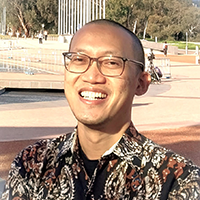
Yulianto Santoso Kurniawan, MD
Yulianto Santoso Kurniawan, MD, Pediatric, is a medical doctor, specializing in child health. He graduated from the University of Indonesia. He recently leads a two-year national risk communication program on COVID-19 in Indonesia, DFAT funded. The program aimed to improve preventive health behavior and vaccine acceptance through risk communication and community engagement. Over the last 15 years, he has worked in the Community Integrated Childhood Illnesses program, developing guidelines and modules for cadres, doctors, and faith leaders using social behavior change framework, led COVID-19 risk communication for cadres, and developed a tuberculosis and pneumonia guidebook. He has worked as a clinician from primary health care level to national referral hospital. He is one of DT Global Asia Pacific Emerging Leaders in International Development, and WHO Asia Pacific trained fact-checkers.
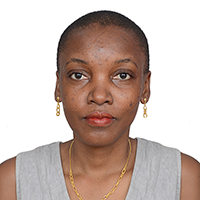
Furaha Kyesi, MD, MPH
Furaha Kyesi is a conscientious and professional Paediatrician and Public health specialist with extensive experience in Child survival interventions working with the Immunization and Vaccine Development (IVD) Program. She also serves key areas of immunization in Tanzania. First, she is member of Vigilance committee since 2020 to date serving the purpose of supporting National. This has shown beyond doubt the strong vaccine safety measures that is existing in Tanzania. Second, she is the secretariat to Tanzania Immunization Technical Advisory Group (TITAG) since April 2021 and assisted in the recommendations to Ministry of Health in introduction of COVID-19 vaccine in the country. Lastly, she is the head of Service Delivery and Introduction of New Vaccine unit in the Immunization Program providing technical support on various activities of immunization service, spearheaded the HPV introduction in Tanzania She has shown to contribute significantly in high immunization coverage in Tanzania.

Heather Lanthorn, ScD, MPH
Heather Lanthorn formerly served as associate director at IDinsight, acting as a senior member of the Research, Evaluation, and Data (RED) team to bring a strong focus on methodological rigor and research ethics across health and education projects. Heather is an affiliate at the Busara Center for Behavioral Economics (Nairobi), a researcher with the Dignity Project (Nairobi), and a research advisor to Tostan (Senegal). Heather holds a ScD in Health Systems, Global Health & Population from Harvard University’s T.H. Chan School of Public Health, an MPH from the University of Michigan School of Public Health, and a BA in anthropology from Wake Forest University.
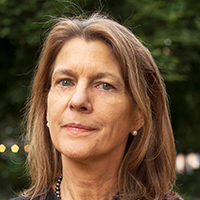
Heidi Larson, PhD
Professor Heidi J. Larson is Director of The Vaccine Confidence Project and Professor of Anthropology, Risk and Decision Science. Her research focuses on managing risk and building trust. She is particularly focused on public cooperation during emergencies – disease outbreak, natural disasters, terrorism and conflict. Prof. Larson previously headed Global Immunization Communication at UNICEF, chaired Gavi’s Advocacy Task Force, and served on the WHO SAGE Working Group on vaccine hesitancy. She is the author of STUCK: How Vaccine Rumors Start – and Why They Don’t Go Away (Oxford University Press, 2020). In 2021, she was awarded the Edinburgh Medal and BBC named her as one of the 100 most influential women in the world.
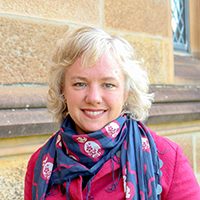
Julie Leask, MPH, PhD
Julie Leask is professor and social scientist specialising in immunisation in the School of Public Health, University of Sydney. She is a member of the Sydney Institute for Infectious Diseases and visiting professorial fellow at the Australian National Centre for Immunisation Research and Surveillance. Professor Leask has qualifications in public health, nursing and midwifery. Her research focuses on the behavioural and social aspects of vaccination and risk communication. She currently holds an Investigator Leadership Fellowship from the National Health and Medical Research Council (NHMRC). She was chair of the WHO/UNICEF Behavioural and Social Drivers of Vaccination working group 2018-2022 and sits on advisory groups for WHO, UNICEF, NHMRC, Therapeutic Goods Administration, and Australian national and state governments. She has won several awards for her research and impact.
Chelsey Lepage, MA
Chelsey Lepage thrives at the intersections of research, technology and practice. She has extensive experience building lasting impact-driven partnerships between often unlikely collaborators and leading complex programs on-ground in more than 20 countries. At Irimi, she leverages human-centered design methods and principles to tailor programs to clients and–most importantly–the communities they serve.
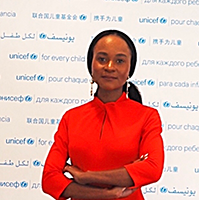
Gloria Lihemo, MS, MA
Gloria Lihemo is an immunization Social and Behaviour Change Specialist at UNICEF headquarters. She coordinates UNICEF’s work on COVID-19 vaccine acceptance and uptake, supporting country and regional initiatives on generating and implementing evidence-based strategies to engage communities to increase COVID-19 vaccination coverage. While at the same time, collaborating with global stakeholders as part of the global Vaccine Acceptance Task Team to develop technical guidance and tools that support countries in their work in promoting demand for vaccination. She has over 15 years’ experience designing and implementing social and behaviour change strategies to improve water, sanitation, hygiene (WASH), health, and nutrition outcomes. Her work spans assignments with international organization including UNICEF, the World Bank, Canada’s International Development Research Centre and INGOs in sub-Saharan Africa (Kenya, Somalia, Chad, and D.R Congo) and Central and South Asia (Pakistan, Tajikistan, and Nepal). A cross-cutting theme throughout her work has been ensuring the integration of gender responsive programming as well youth engagement and participation.
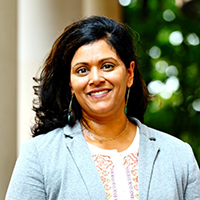
Rupali Limaye, PhD, MPH, MA
Rupali J. Limaye, PhD, MPH, MA, serves as a full-time faculty member at the Johns Hopkins Bloomberg School of Public Health, in the Departments of International Health, Epidemiology, and Health, Behavior and Society. Widely seen as an expert in vaccine behavior and decision-making, including vaccine hesitancy and acceptance, she serves as the Deputy Director at the International Vaccine Access Center. Primarily focusing on infectious diseases, Dr. Limaye is a social and behavioral scientist and health communication scholar. Her mixed-method work examines how various influences affect health behavior and how to leverage those influences to affect positive behavior change. She also studies how health information can best be communicated to individuals in different contexts and through different channels. In her 15 years of working in global health, she has worked in more than 30 countries from both research and implementation perspectives, on topics including immunization, family planning, HIV/AIDS, maternal and child health, and alcohol, and teaches classes on health behavior change and persuasive communication. She received her PhD from the Johns Hopkins Bloomberg School of Public Health. She also holds an MPH in global health, an MA in international affairs, a BA in political science, and a BS in journalism.
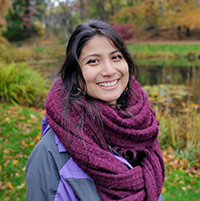
Porcia Manandhar, MSPH, PhDc
Porcia Manandhar, MSPH, is a doctoral candidate at the Johns Hopkins Bloomberg School of Public Health (BSPH) in the Department of International Health. She has field experience and a keen interest in conducting vaccine science and policy research in low-resource settings.
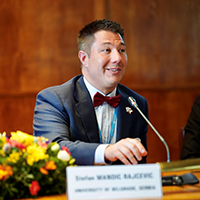
Stefan Mandić-Rajčević, MD, PhD
Stefan Mandić-Rajčević is a doctor of medicine with a Ph.D. in Occupational Medicine and Industrial Hygiene from the University of Milan with more than ten years of experience in the field of research, with a particular focus on research and teaching methodology, instructional design, data collection, management, processing, analysis, and reporting. His main competencies include public health research and teaching, infodemic management, behavioural and cultural insights, and the development and validation of data collection instruments. His international experience includes education, work in several European and non-European countries, and collaboration through projects in Central Asia, where he served as an instructor in public, environmental and occupational health, research design, and statistics. Since 2010, he has worked in a World Health Organization (WHO) collaborating center and on various WHO projects in international collaboration and evidence-based medicine. He is a certified WHO Infodemic Manager, Castor Electronic Data Capture (EDC) for clinical trials Data Manager, and Research Electronic Data CAPture (REDCap) Administrator of the Faculty of Medicine (University of Belgrade), and an expert in online and offline data collection tools, and open-source tools for reproducible research (R programming language and environment for statistical computing). He has published more than 45 peer-reviewed scientific papers in which he assumed different roles, from principal investigator to statistician.
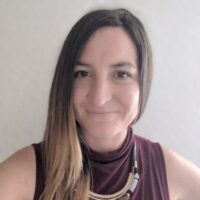
Emily Miller, BSc, MGH
Emily Miller is a faculty research associate in the department of International Health at Johns Hopkins Bloomberg School of Public Health and the International Vaccine Access Center (IVAC). She specializes in global health education and supports a variety of education and learning activities including curriculum design, course development, learner engagement, and other capacity strengthening initiatives. She has spent four years working abroad, and her professional experience has spanned a range of coordination, implementation and M&E activities for global health programs and community health engagement in over 25 countries. She also spent two years teaching English as a Second Language (ESL) and is fluent in Spanish. Since 2018, she has focused on global health education and transformative learning, and she is particularly passionate about models that preserve local expertise and embrace diverse epistemological knowledge systems. Strengthen a range of education and training initiatives within the International Vaccine Access Center in the International Health Department of the Bloomberg School of Public Health. Her current projects focus on maternal immunization, comprehensive primary healthcare, multisectoral convergence, vaccine hesitancy, and optimizing public health training. Emily holds a BSc in Public Health from the University of Maryland, College Park, and a Master of Global Health (MGH) from the Universitat de Barcelona.
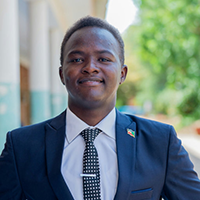
Mohamed Modber, BSN
Mohamed Modber is a Community Health Nurse, Young Nurse Leader, Researcher, Global Health Enthusiast and Vaccine advocate. He graduated from the University of Khartoum Faculty of Nursing Sciences with a Bachelor of Science in Nursing and has worked with several nursing bodies that have helped him strengthen his leadership. During his time at Global Health Focus Africa (GHF), Mohamed organized the first international Global Health Nursing Course University of Khartoum in 2017, went through constant mentorship, strengthened his research skills, and published research papers with GHF. Mohamed has experienced the Sudan health system at various levels: as a clinician providing care and health education to the community, public health practitioner in the Sudan Ministry of Health, and humanitarian aid provider with Médecins Sans Frontières France. Mohamed was awarded the Nursing Now Challenge, Sabin Vaccine Institute’s Global Solution Initiative Award for implementing a project that contributed to raising awareness of Sudanese nurses to tackle covid-19 vaccine hesitancy in Sudan. He was also awarded the International Nurses Day 2022 Nursing Now Challenge (NNC) Award for Leadership in recognition of his leadership services at the local and regional levels. Mohamed received the Burdett Trust for Nursing Scholarship to attend the Global Health Network Conference (TGHN) 2022 in South Africa, interact with global nurse leaders, and learn how to transform nursing research into policy.
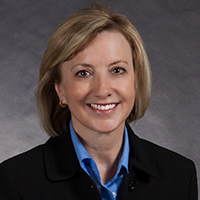
Susanne B. Montgomery, PhD, MPH, MS
Susanne Montgomery, PhD, MSN, MPH, is a social/behavioral epidemiologist with a focus on hard-to-access, underserved populations experiencing health disparities. She has received funding from NIH, CDC, the State of CA and many Foundations, has published over 140 peer reviewed articles, and has conducted and/or served as a consultant on many evaluation and research projects in the US as well as in internationally (i.e. Rwanda, Sierra Leon, South Africa, Congo, Cameron, South America, South East Asia, India, and refugee projects in Europe). She is part of a regional vaccine hesitancy research group, is certified as a CRM guide and leads several translational CRM research efforts.
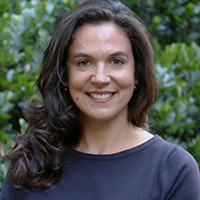
Corrina Moucheraud, ScD, MPH
Dr. Corrina Moucheraud is an Associate Professor in the Department of Health Policy and Management at the Fielding School of Public Health (University of California Los Angeles), and Associate Director at the UCLA Center for Health Policy Research. Dr. Moucheraud is a global health policy and systems researcher, focused on the question: how can we deliver high-quality, efficient, equitable, sustainable health services in resource-constrained health systems? Dr. Moucheraud obtained her ScD from the Department of Global Health and Population at the Harvard T.H. Chan School of Public Health, and her MPH from the Department of Health Behavior at the University of North Carolina Gillings School of Global Public Health.
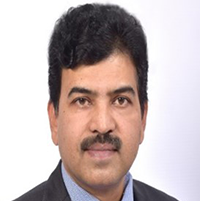
Raveesha Mugali, MD, MPH
Dr. Raveesha R Mugali is an experienced public health physician and leader who has worked in 18 countries over the past 20 years. His areas of expertise include global public health, health management, and innovations in global health. Currently, he serves as a Health Specialist-Immunisation at UNICEF, where he is leading Cambodia's Covid-19 response, improving essential health services, and strengthening immunization systems. Prior to this, he led the Gavi.4.0 HSS program with Gavi the Vaccine Alliance in Geneva, managing 16 country portfolios. He also contributed to improving health services in Afghanistan during a humanitarian crisis, designed and secured funds from donors for and worked in India on maternal and child health and disease control programmes. Dr. Raveesha is a physician and holds an MPH and MBA in health management and has done advanced studies in designing transformative innovations in global public health from Johns Hopkins University in the USA. He is also the author of several peer-reviewed articles, theses, book chapters, and funding proposals.
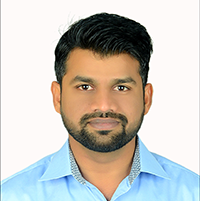
Zia Muneer, MPhil
Zia Muneer is a development professional from Pakistan and earned a master’s degree in development economics from the Institute of Business Administration, Karachi, and studied at Concordia College, MN, USA, during undergraduate studies. Over the past seven years, Zia has led the field implementation, monitoring, and evaluation of public health projects and programs, including randomized control trials. He has experience in public health, behavioral and experimental economics, and social health protection. Currently, he is associated with the Maternal & Child Health Program at IRD Pakistan. He is primarily responsible for monitoring the mobile conditional cash transfer (mCCT) program for immunization scale-up in the seven low-coverage districts of Sindh, Pakistan. Zia’s research interests include monitoring and evaluation, economic evaluations in healthcare, and behavioral economics.
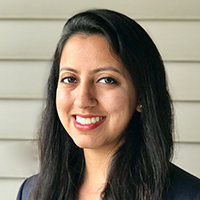
Kiranmayee Muralidhar, MBBS, MPH
Dr. Kiranmayee Muralidhar, MBBS, MPH is a Research Physician at Public Health Research Institute of India (PHRII), Mysore, India. She has a medical degree from Vydehi Institute of Medical Sciences, Bengaluru, India and a Master's in Public Health from the University of Miami, Florida, USA. She is a primary care physician and an epidemiologist by training. Over the past five years, she has been working in geriatrics, women’s health, and health disparities with a focus on social and psychological domains along with physical health. During her public health studies, she worked at the Miami VA Healthcare System and the University of Miami’s Department of Epidemiology. She also has experience working on infectious and non-communicable diseases in various settings in South India. She is currently pursuing her PhD at JSS Academy of Higher Education and Research, Mysore, India and is a National Institutes of Health (NIH) Global Infectious Diseases research trainee. She also mentors students and fellows in public and global health at PHRII. Dr. Muralidhar has a broad research background with projects in the U.S. and India and has published work in multiple peer-reviewed journals as well as presented at renowned international conferences.
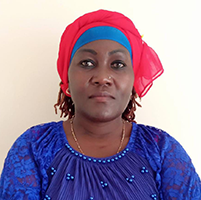
Lillyan Mutua, KECN, KRCHN
Lillyan Mutua works for Nairobi City County Government-Health Services, Kenya. She is Head of Health promotion, in-charge of Advocacy, Risk Communication, Community Engagement, Public literacy, Health Communication for Health Services in Nairobi. She has been instrumental in delivering strategic Social Behavior strategies during the COVID19 pandemic, COVID19 Vaccination, HPV, Polio and Measles campaign. She is passionate, committed and focused to implement Health Promotion Models to empower citizen make informed decisions towards improving their quality of health. She attributes her zeal from cross-country learning and sharing forums, and the invaluable knowledge from the expert mentors who she has come across in her line of duty. She aspires to make communities better since her first appointment as a community nurse in the rural Kitui in the early 90s. Lilly believes there is opportunity to use digital space and social media to promptly inform and educate communities. School going children and Women should be used as agents of Behavior change at household and in communities. She believes “Embracing Health Promotion and Preventive Promotive Health” is the way to eradicate immunization Preventable diseases and prevent epidemics. Let us leverage on Health Promotion as the next big agenda in changing Health Perspective.
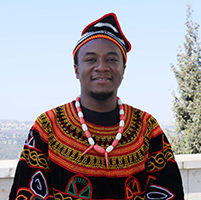
Sangwe Clovis Nchinjoh, MD, MPH, MSc
Dr. Sangwe Clovis Nchinjoh is a Public Health Physician and Researcher with sound educational background (MD, MPH, and MSc - Healthcare management) and extensive experience and passion for Essential Healthcare Access, Health System Strengthening, and Disease Control, especially in fragile settings. His resilience and resourcefulness are reflected in five years of progressive impact at international, national, and sub-national levels through excellently executed operational and strategic roles. Molded by tears and passion for serving vulnerable communities, Sangwe is constantly developing, managing, coordinating, or volunteering in projects that will improve access to health services in remote rural areas, nomadic populations, and conflict & fragile settings.
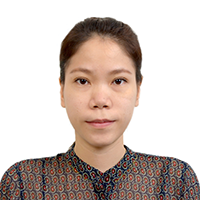
Chattiya Nitpolprasert, PhDc
Chattiya Nitpolprasert is a social and behavioral researcher at Adam’s Love Global Foundation for MSM (men who have sex with men) and Transgender Health (ALGO), leading in implementing technology-based interventions and conducting behavioral research in HIV prevention and care. Since 2010, Nitpolprasert has successfully harnessed communications technology in engaging hard-to-reach, discreet and closeted MSM and transgender (TG) individuals into early HIV testing and treatment in Southeast and East Asia. She has extensive experience in designing innovative and culturally sensitive strategies to address HIV care, support and counseling needs of key populations living with HIV. She is currently a PhD candidate at the Amsterdam Institute for Global Health and Development (AIGHD), Department of Global Health, Amsterdam University Medical Centers, University of Amsterdam, the Netherlands.
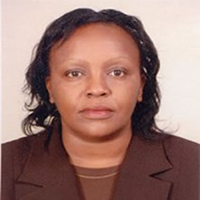
Doris Njomo, PhD, MA
Dr Doris Njomo is a principal research scientist at the Kenya Medical Research Institute (KEMRI) in Nairobi with a PhD in Public Health from Jomo Kenyatta University of Agriculture and Technology. Her area of research interest is in social determinants of health and health-seeking behavior, and she has experience of close to 20 years conducting implementation research in control and elimination of preventive chemotherapy Neglected Tropical Diseases (NTDs). She has won several research grants including but not limited to the USAID, UK DFID through the NTDs Support Centre at the Taskforce for Global Health, Bill & Melinda Gates Foundation and UNICEF/UNDP/World Bank/WHO Special Programme for Research and Training in Tropical Diseases. Dr. Njomo is an African Doctoral Dissertation Research (ADDR) fellow where she has been recognized for research embodiment and has extensive experience in conducting mixed methods research studies. She has published 40 manuscripts in peer-review journals and mentored several postgraduate students. She has reviewed grant applications including but not limited to European and Developing Countries Clinical Trial Partnerships (EDCTP), the Consortium for National Health Research (CNHR), the Coalition for Operational Research (COR) on NTDs, Neglected Tropical Diseases NGO Network and participated as a panelist/judge in several fora. Doris is a member of the African Research Network for NTDs where she serves as a mentor and grant reviewer. Currently she is serving as the Centre Director for Eastern and Southern Africa Centre of International Parasite Control (ESACIPAC), KEMRI. She have been serving as a reviewer in the KEMRI Institutional and Ethics Review Board for the last 10 years and as a member of the KEMRI annual scientific and health conference secretariat for the last 13 years.
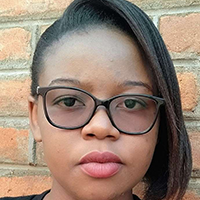
Dumisile Nkosi, MSc
Dumisile Nkosi is a highly motivated registered medical doctor from Malawi who was trained with the University of Malawi College of Medicine and a vaccinologist trained by the University of Siena. Currently, they work as a Clinical Trial Coordinator at the Training and Research Unit of Excellence in Malawi, overseeing a clinical trial that focuses on post-discharge malaria chemoprevention in under-five children admitted for severe anaemia and severe malaria in Malawi, Uganda, and Kenya. Their goal is to become a clinical research leader in infectious disease epidemiology in Africa. They are particularly interested and passionate about clinical research aimed at generating evidence to reduce the burden of infectious diseases in pregnant women and children in Malawi and across Africa.

Chisom Obi-Jeff
Chisom Obi-Jeff is a Global Health Researcher and Implementation Scientist with demonstrated expertise in designing, implementing, and evaluating innovative and culturally acceptable primary healthcare interventions to improve the uptake and delivery of health services in low-resource settings. Her research interests include implementation research to inform policy decisions and program strategies and using participatory approaches and behavioral insights to address global health challenges, including vaccine hesitancy. Chisom is currently working with her team to strengthen the capacity of immunization program managers and health workers at the subnational levels in Nigeria to better understand and use immunization data for tailored immunization programs by incorporating adult learning principles in the design and delivery of immunization training. By equipping the immunization workforce with human-centered design tools, Chisom and her team hope to pave the way for tailored immunization programs that resonate with the unique needs of diverse populations. Through this transformative work, they are poised to drive significant advancements in immunization service delivery and coverage.
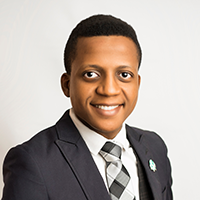
Isaac Olufadewa, MBBS, MHS
With over a decade of experience in global health and social entrepreneurship as well as his over 45 peer-reviewed publications, Dr Isaac Olufadewa is an influential global young leader. He is a medical doctor, researcher, innovator, author and health policy leader with expertise in global public health and a staunch advocate for mental health and sexual health of young people. Dr Isaac is the Founder of Slum and Rural Health Initiative (SRHIN), a registered organization that takes quality healthcare to underserved people in urban slums, IDP (refugee) camps and hard-to-reach rural communities across several countries in Africa which is registered in four countries (Nigeria, Ethiopia, The Gambia and Sierra Leone). He was the youngest International Expert on the LANCET COVID-19 Commission Task force on Humanitarian Relief, Social Protection and Vulnerable Groups where he worked with former policymakers, researchers, advocates, UN officials to propose recommendations included in policy documents for the COVID-19 pandemic and post-pandemic period. He specifically led or co-authored two policy documents which are published on the Lancet Commission website – the first is on Children and youth and the other is on persons living with a disability. He earned his medical degree at Nigeria’s Premier University – the University of Ibadan and his postgraduate degree at the Pan African University of Life and Earth Sciences Institute (PAULESI) on a fully-funded scholarship from the African Union Commission, he also has a certificate on Public Administration and Management from the University of Minnesota, USA on a fully-funded opportunity from the US Department of States and IREX. He has over 40 peer-reviewed publications in reputable journals such as the Lancet Global Health, Journal of Global Health, Global Health Journal, the Lancet Public Health among others in mental health, sexual health, digital health and global health inequities among others.
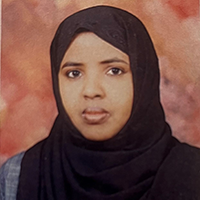
Hinda Omar, BASc
Hinda Omar has many years of experience working as a nurse and in public health as an expert in the areas of mother and child health, Chronic diseases, infection control, and health research. Hinda has worked 16 years as a Registered Nurse in United Arab Emirates in different places like ER Dept., Mother and baby clinic, Chronic disease clinic lead, quality improvement group. Hinda was part in different researches including Asthma, Diabetes, Women weight control, and Lip. Hinda is currently the Health Educator Specialist in the Minnesota department of Health since 2014 in the immunization section. Hinda is a mentor, adviser, and consultant for childhood immunization. Hinda provides individual and group coaching about immunizations and public health improvement, and she worked on two measles outbreaks as outreach lead and prevention. Hinda has been awarded numerous certificates on her work in public health and ethics.
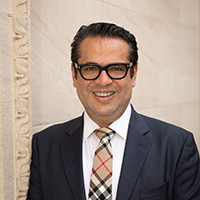
Saad Omer, MBBS, PhD
Dr. Saad Omer is currently the Director of the University of Texas Southwestern Medical Center, and has conducted studies in the United States, Guatemala, Kenya, Uganda, Ethiopia, India, Pakistan, Bangladesh, South Africa, and Australia. Dr Omer’s research portfolio includes epidemiology of respiratory viruses such as influenza, RSV, and - more recently - COVID-19; clinical trials to estimate efficacy of maternal and/or infant influenza, pertussis, polio, measles and pneumococcal vaccines; and trials to evaluate drug regimens to reduce mother-to-child transmission of HIV. Moreover, he has conducted several studies on interventions to increase immunization coverage and acceptance. Dr Omer’s work has been cited in global and country-specific policy recommendations and has informed clinical practice and health legislation in several countries. He has directly mentored over 100 junior faculty, clinical and research post-doctoral fellows, and PhD and other graduate students. Dr. Omer has published widely in peer reviewed journals including the New England Journal of Medicine, JAMA, Lancet, British Medical Journal, Pediatrics, American Journal of Public Health, Science, and Nature and is the author of op-eds for publications such as the New York Times, Politico, and the Washington Post. Dr Omer has received multiple awards –including the Maurice Hilleman Award by the National Foundation of Infectious Diseases for his work on the impact of maternal influenza immunization on respiratory illness in infants younger than 6 months-for whom there is no vaccine. He has served on several advisory panels including the U.S. National Vaccine Advisory Committee, Presidential Advisory Council on Combating Antibiotic-Resistant Bacteria -Vaccine Innovation Working Group, and WHO Expert Advisory Group for Healthcare Worker Vaccination. He has also served as an academic affiliate of the Office of Evaluation Sciences –formerly known as the White House Social and Behavioral Sciences Team.
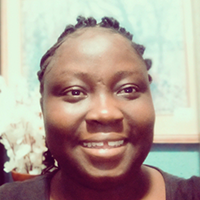
Mofeyisara Omobowale, PhD
Mofeyisara Oluwatoyin Omobowale holds a PhD. in Anthropology from the department of Archaeology and Anthropology, University of Ibadan, Nigeria. She is University of Ibadan Postgraduate school Scholar 2010, a recipient of the American Council of Learned Societies–African Humanities Programme (ACLS-AHP) Doctoral Fellowship 2012, the Cadbury Fellowship (Department of Anthropology and African Studies, Birmingham University) 2014 and ACLS-AHP Post-Doctoral Fellowship 2016. An Alumni, Brown International Advanced Research Institute 2013, a Carnegie Fellow and an Investigator on Bill and Melinda Gates Foundation sponsored Project, Immunization for working mothers in Ibadan (SheVaccs) 2019-2021. Her interests lie in medical/cultural anthropology, public health anthropology, maternal, child and adolescent studies, and medical history. Mofeyisara is a Senior Research Fellow/Lecturer at the Social and Behavioural Health Unit of Institute of Child Health, College of Medicine, University of Ibadan, Nigeria.
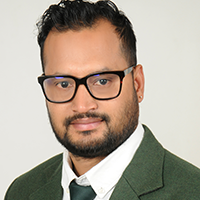
Suman Pant, MBBS, MPH-GH
Dr. Suman Pant received his Master’s degree in Public Health-Global Health at Thammasat University, Thailand, and post-graduated from Global Clinical Scholars Research Training Program at Harvard Medical School recently. He has been serving as an academic researcher at the Government of Nepal, Nepal Health Research Council. He holds extensive experience in managing both public health and clinical research in Nepal, including study protocol design, regulatory submissions, budgetary control, implementation, pharmacovigilance, monitoring, data management, community engagement, recruitment and retention of human subjects, scientific writing, and dissemination. Dr. Pant has recently completed Nepal government-funded National COVID-19 Vaccine Survey as a lead investigator. He was involved as a co-investigator (trial monitor) in Phase III, a multinational, placebo-controlled COVID-19 vaccine trial in Nepal funded by Sanofi Pasteur Inc. He has also been involved as a co-investigator in the Phase III clinical trial of a heterologous COVID-19 booster vaccine developed by SK Bioscience jointly with the Institute for Protein Design(IPD) at the University of Washington and supported by the Coalition for Epidemic Preparedness Innovations (CEPI) and the Bill & Melinda Gates Foundation (BMGF). He is also a co-investigator of the COVID-19 vaccine post-introduction evaluation (cPIE) in selected sites of seven provinces of Nepal, funded by the Centers for Disease Control and Prevention (USA). Additionally, he recently completed MLI funded Community-based Cluster Randomized Controlled Trial that evaluated the impact of microbe literacy strategies on improved vaccine uptake in peri-urban slum areas in Kathmandu. Dr. Pant has contributed to research on the topic(s): Therapeutic and Vaccine Clinical Trials, Community Trials, Outbreak Investigations, Molecular Epidemiology, Antimicrobial Resistance and Stewardship, and Health Research Ethics. He has an h-index of nine and co-authored 29 publication(s) receiving 828 citation(s).
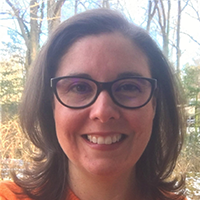
Nadia Peimbert-Rappaport
Originally from Mexico, Nadia Peimbert-Rappaport has been a professional in communications, media relations, and public affairs since 2001. She currently oversees collaborations with partners co-designing and implementing programs aimed at providing knowledge, skills, and connections for journalists specifically based in Africa, the Americas, Asia, and globally. She supports similar activities with health workers focused on immunization. Nadia worked in the environmental sector for 11 years, with a focus on climate change and sustainable development. She began her career working for the State Department at the U.S. Embassy in Mexico City and later served as Director of International Media and Official Visits at the Office for the President of Mexico. Before joining Sabin, Nadia supported the Pan American Health Organization’s COVID-19 public affairs response in the Americas. She has ample experience in crisis-management communications, media and storytelling training, engagement, and strategic communications, all in multicultural and diverse settings. She has also organized multiple reporting tours and other activities for journalists, including in rural scenarios and Indigenous communities, and has led outreach efforts for numerous events at all levels.
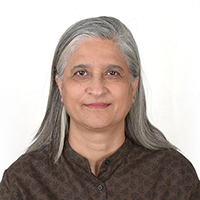
Deepa Risal Pokharel, MA
Deepa Risal Pokharel is the Senior Adviser-Social Behaviour Change and team lead for Immunization Demand in UNICEF headquarters in New York. She has over 25 years of diverse experience in designing, leading, managing and implementing social and behaviour change communication (SBCC) strategies and interventions at national, regional and global level. Deepa has represented UNICEF in various global and regional forums to promote vaccine demand and community engagement. Before joining New York Headquarters, Deepa worked in UNICEF Pakistan, UNICEF Regional Office in Nairobi, UNICEF Zambia and UNICEF Nepal in different capacities working in immunization, health and broader social and behaviour change on child survival, development and protection. She is a believer in people’s positive strength and power of team to make things work.
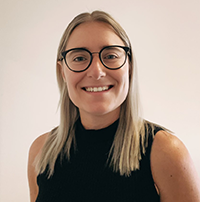
Carla Puca, MPH, MIDI
Carla Puca is employed as a mixed-methods researcher within the Telethon Kids Institute’s Wesfarmers Centre of Vaccines and Infectious Diseases. She is passionate about working in the infectious disease epidemiology research space. Her current projects focus on immunisation uptake within the Aboriginal community in Perth. Her previous employment at Aboriginal Health Council of WA, involved exploring ways to reduce the transmission of trachoma and other preventable infectious diseases in remote Aboriginal communities through targeted environmental health strategies. Ms. Puca holds a Master of Public Health (University of Western Australia), a Master of Infectious Diseases Intelligence (University of New South Wales) and is currently undertaking a PhD exploring current and future approaches to pandemic preparedness in regional West Australian aged care networks.
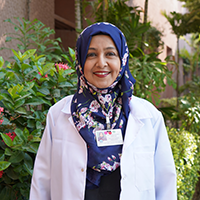
Farah Qamar, MD, MSc
Dr. Farah Qamar is an Associate Professor in the Department of Pediatrics and Child Health at the Aga Khan University (AKU), Karachi, Pakistan. Her area of interest and expertise is pediatric infectious diseases. Her current research portfolio consists of several large grants covering diverse areas such as typhoid, diarrhea, COVID-19 and nutrition. She led the outbreak investigation of extensively drug resistant (XDR) typhoid fever in 2017 and published highly cited research in peer reviewed medical journals such as the Lancet and The New England Journal of Medicine. As a result of this work, Pakistan was the first country among GAVI-eligible low-income countries which introduced the Typbar-TCV vaccine in their EPI program. Moreover, the data on vaccine impact and safety, generated from my ongoing projects will serve as a roadmap for other countries in the region to inform their policy decisions regarding the introduction of Typbar-TCV in their routine immunization program. She has worked in the field of vaccine preventable diseases for more than a decade.
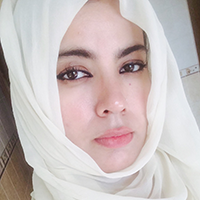
Rubina Qasim, MScN
Rubina Qasim, RN/RM, BScN, MScN, is working as Assistant Professor at the Institute of Nursing & Midwifery, Dow University of Health Sciences Karachi, Pakistan. Rubina has more than 10 years of teaching and research experience in both public and private sector academic institutions in Pakistan. Her area of research is maternal and child health including routine immunization, hesitancy, and vaccine acceptance among marginalized hard-to-reach population. Rubina is the recipient of Sabin 2020 Social and Behavioral Research Grant. She is leading a team of research staff including volunteer undergraduate nursing students, working for the health and social uplifting of the marginalized population living in the slum peri-urban Karachi, Pakistan.
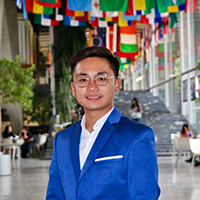
Mark Reñosa, MSN
Dr. Mark Reñosa is a nurse by training (he has a Master's and Ph.D. in Nursing Science from the Philippines) with over a decade of clinical and public health experience. A holder of an MSc in International Health and a current Ph.D. student at the Heidelberg Institute of Global Health. Concurrently, Mark acts as Supervising Science Research Specialist for the Research Institute for Tropical Medicine, a research arm of the Philippines Department of Health. Their research interests lie at the intersection of health policy and promotion, systems thinking, communication, and knowledge translation with a particular focus on the development of global health interventions using human-centered design and implementation research for infectious and neglected tropical diseases. Mark's current dissertation work explores the role that families, communities, and frontline healthcare workers can play in shifting and transforming vaccine confidence in the Philippines. Mark is an Emerging Voices for Global Health (2022) Fellow of Health Systems Global.
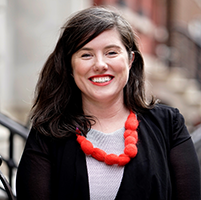
Nessa Ryan, MPH, PhD
Nessa Ryan, MPH, PhD is a PHI/CDC Global Health Epidemiology Fellow, working on the Demand for Immunization team within the Immunization Systems Branch (ISB) of the Global Immunization Division (GID) of CDC-Atlanta. Nessa comes to us from New York University where she completed her PhD in Epidemiology and a post-doc fellowship in Global Implementation Science. Nessa will be working with her team on carrying out innovative applied epidemiologic research and implementation and behavioral science to assess factors contributing to vaccine hesitancy, and to develop, implement and evaluate behavioral interventions to improve vaccine confidence and uptake globally. Nessa is excited to contribute to the new field of infodemiology to understand how misinformation and disinformation spread through social networks and to develop cognitively based interventions to address and manage infodemics. Nessa speaks conversational French.
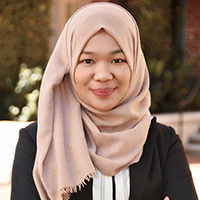
Lili Nur Indah Sari, MPP
Lili Nur Indah Sari is a Senior Program Officer for Vaccine Program at Clinton Health Access Initiative (CHAI), Indonesia Office. At CHAI, Lili main responsibilities include providing technical support for the design and implementation of sustainable financing for immunization program particularly for the new vaccines. Additionally, she also supports strengthening government institution on immunization planning and budgeting at subnational level. During COVID-19, she shifted focus to support the Ministry of Health and relevant subnational governments in designing and course correcting the approaches and accelerate the COVID-19 vaccination uptake. With support from GAVI under COVID-19 Vaccine Delivery Support (CDS) Early Access Window grant, she worked collaboratively with the Center for Health Research at Universitas Indonesia to assess and understand the immediate need for the country to ramp up and reach its COVID-19 National Deployment and Vaccination Plan (NDVP) target by conducting vaccine acceptance survey to specific groups, including the elderly, general workers (informal sector), and groups of adolescents (12-17-years-old) and young-age (6-11-years-old) across Indonesia. This survey aims to produce recommendations on specific strategies to increase COVID-19 vaccination uptake (both partially and fully vaccinated status) based on the identified critical drivers of vaccine acceptance among the target population.
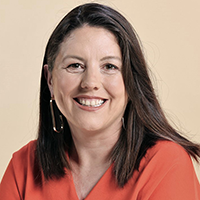
Holly Seale, PhD, MPH
Associate Professor Holly Seale is a Social Scientist at the School of Population Health, University of New South Wales in Sydney Australia and the Deputy Chair for the Collaboration on Social Science and Immunisation. Over 17 years, Holly has led a research program focused on the sociological aspects of infectious diseases and infection prevention. Specifically, her research encompasses the individual, and organisational factors that influence acceptance with infection prevention strategies and community engagement. Her research spans pharmaceutical and non-pharmaceutical prevention strategies, includes qualitative and quantitative research approaches and consumers such as hospital healthcare workers, special at-risk groups (people with underlying illness, migrants/refugees), students and the general public. She works closely with local and state health departments to lobby for improved opportunities for vaccination, as well as to improve communication packages
Saransh Sharma, MSc
Saransh Sharma has over ten years’ experience applying behavioral science and human centered design in the global health and development sectors. In his role as Behavioral Science Lead at Final Mile, Saransh has managed complex research and design projects to drive behavior change at scale in South Asia, Africa and the United States. With a background in management and public policy, he’s worked in diverse domains including maternal and child health, vaccine uptake, HIV prevention, financial inclusion, gender empowerment, sanitation, nutrition and tobacco cessation.
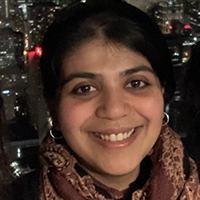
Sneha Shashidhara, PhD
Dr. Sneha Shashidhara is a senior research fellow at the Centre for Social and Behaviour Change, with a teaching position at the Psychology Department of Ashoka University. She is a cognitive neuroscientist by training working as a researcher studying mechanisms of the brain underlying higher-order cognition and decision making, with an interest in the interaction between cognition and social psychology. A Gates-Cambridge scholar, she did her PhD, studying the multiple demand network in the brain, at the University of Cambridge. This network is active in different demands, be it language, memory, math etc and handles many types of task difficulty.
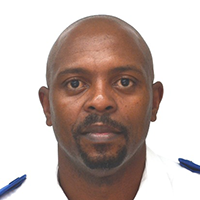
Mpho Z. Shelile, MSN, PhDc
Mpho Z. Shelile, aged 39, is a registered nurse-midwife who is a PhD Candidate at the North West University South Africa and currently working as a lecturer at the National University of Lesotho. He is an Immunization Advocacy Champion and has been on several occasions engaged by the World Health Organization-Lesotho; as an Independent Monitor of vaccination campaigns in Lesotho. Being a solution orientated nurse who aspires to be part of a team that implements national health policies for economic growth and social development, while developing self and improving health systems for better patient care, he voluntarily worked in hard to reach areas of Lesotho to ensure vaccine equity and acceptance. He previously worked at varying places which include Queen Elizabeth II hospital, National Health Training College and Nestle South Africa. Mr Shelile is currently a member of the University Senate and also a member of the Lesotho Medical Journal Editorial board. Mr Shelile has presented papers and joined panel discussions at different conferences and seminars which include the East Central and Southern African College of Nursing (ECSACON) Conference, the International Council of Nurses (ICN) Conferences and the World Innovation Summit for Health (WISH) to mention but a few.
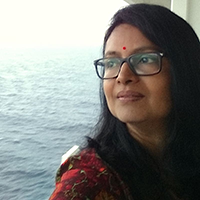
Jaya Shreedhar, MD
Dr. Jaya Shreedhar is both a health and development journalist and medical doctor based in Chennai, India. Experienced in print media, radio, television, and digital media, she specializes in topics like human rights and health, specifically HIV/AIDS and TB. From 2004-2008, Jaya led the Internews Local Voices project in Chennai, an HIV journalism training program which helped journalists understand the science and tell compelling stories to reduce stigma. She is a consultant for international institutions including WHO and UNICEF and teaches public health journalism at the Asian College of Journalism.
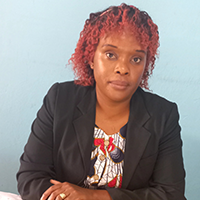
Linda Shuro, PhD
Dr. Linda Shuro is based in South Africa and is a Post Doctoral fellow with the University of Western Cape, School of Public Health. She holds a PhD in Public Health with the same university and has over a decade experience in participatory methods and community engagement. Dr. Linda Shuro is currently coordinating evaluation activities for a multi-site community participatory based project to achieve full childhood immunization coverage in Mozambique and Malawi. Her specific interests are in health promotion, qualitative research, and the use of frameworks to define implementation outcomes and for evidence translation. Dr Linda Shuro has experience in teaching and student supervision in health promotion at undergraduate, postgraduate diploma and master’s level and has been involved in coordinating various public health interventions and advocacy in Zimbabwe, South Africa and in Africa at community and national level. She enjoys spending time with her family doing sports.
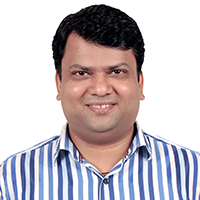
Prem Singh, MBBS, MD
Dr. Prem Singh is a senior public health physician with more than 20 years of progressive experience in immunization and child health programs. His expertise is in systems strengthening, polio eradication, cold chain and vaccine supply chain, immunization campaigns, new vaccine introduction, M&E, action research, demand generation, COVID-19 pandemic response and VPD & safety surveillance. Dr. Singh is currently Associate Director and leads the immunization portfolio for the Jhpiego India country office. Previously, as Senior Technical Advisor for COVID-19, he supported the COVID-19 vaccine cell at the Ministry of Health and Family Welfare (MoHFW) in India, providing technical and operational support to multi-sectoral coordination, planning, implementation and monitoring of the world’s largest COVID-19 vaccination program. In addition to his Bachelor of Medicine and Bachelor of Surgery, Dr. Singh holds a master’s degree in community health administration and post-graduate diploma in health administration. Dr Singh had experience of working in leading UN agencies like UNICEF, WHO, UNDP and other organizations in the field of Immunization like Immunization Technical Support Unit, JSI, PHFI & PATH including international experience of working in Bangladesh & Nigeria Key Areas of expertise: Immunization, Vaccines & Biologicals; Vaccine Preventable Diseases & Vaccine Safety surveillance; Monitoring, Evaluation & Research; and Health System Strengthening.
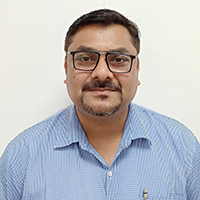
Yatender Singh, MSW
Yatender Singh is a seasoned development professional with more than two decades of experience in managing health, nutrition, and WASH projects and leading an NGO consortium. He has greatly contributed to designing and implementing social mobilization strategies for immunization campaigns for polio, Measles, Rubella, and WASH in some of the challenging parts of the world like Western Uttar Pradesh and northern Nigeria for the CORE Group Partners Project (CGPP) and UNICEF, respectively. Mentoring field teams and capacity building of NGO partners as well as government frontline workers are some of his areas of interest. Yatender has presented papers at various conferences like the Global Health Practitioners Conference of CORE Inc. in the USA. He has done a Master of Social Work and a postgraduate diploma in Public Health.
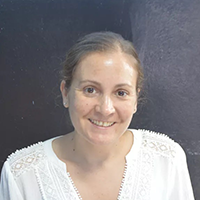
Laura Skrip, PhD
Dr. Laura Skrip is a quantitative epidemiologist with expertise in mathematical modeling and statistical analysis. She is an Associate Professor at the University of Liberia School of Public Health, where she teaches Biostatistics and Epidemiology and supports efforts to engage students in practicum and thesis opportunities. She is founding director of the Participatory Modeling and Analytics for Health (ParMAH) Lab, aimed at enhancing quantitative research capacity among public health researchers and practitioners. In this role, she developed and leads implementation of an R Coding and Biostatistics certificate program. As a researcher, it is her goal to collaboratively generate evidence that can guide public health decision-making in complex emergencies. She has worked extensively with social scientists, clinicians, basic science researchers, and communities to inform mathematical models for quantifying the potential impact of specifically behavior-focused tools and approaches, including risk communication and community engagement.

Joe Smyser, PhD, MSPH
Dr. Joe Smyser is the CEO of PGP (The Public Good Projects), a public health nonprofit specialized in large-scale media monitoring programs, social and behavior change interventions, and cross-sector initiatives. PGP is heavily involved in vaccine promotion efforts. For the past three years, PGP has designed and managed Kaiser Permanente's seasonal flu promotion campaign within communities of color. This campaign has increased vaccination rates and reduced vaccine hesitancy. For the past two years, PGP has led the nation's largest vaccine communications monitoring program, focused particularly on vaccine hesitancy and opposition. The system, Project VCTR, is used by over 400 health organizations. Recently, UNICEF partnered with PGP to create the Vaccine Demand Observatory. The Observatory tracks and responds to vaccine misinformation, supporting UNICEF country offices and their community partners. Finally, PGP runs Stronger, a national advocacy campaign against misinformation and for science and vaccines. Stronger reaches millions of people every month with calls to action. Dr. Smyser received his Masters in Public Health from San Diego State, his PhD in public health from University of California San Diego's School of Medicine, and his postdoctoral training at the CDC.
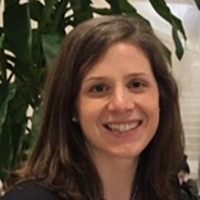
Theresa Sommers, PhD, MPH
Theresa is the Senior Manager of Research for the Vaccine Acceptance and Demand Initiative at the Sabin Vaccine Institute. Her background spans infectious disease programming and policy, including pandemic preparedness and response, within multilateral (WHO) and bilateral (US CDC) health organizations and on-the-ground qualitative health research in Sub Saharan Africa and the Southern US. She has also worked within academic institutions and the nonprofit sector to support infectious disease capacity building and research in LMICs. She has been adjunct faculty of multiple universities for over six years, teaching both undergraduate and graduate-level courses and is currently an affiliated Researcher for the Migration and Health Project Southern Africa within the African Centre for Migration and Society at Wits University (South Africa), as well as a Course Director in Research Ethics at the Department of Infectious Disease and Global Health at Tufts University, Cummings School of Veterinary Medicine. Theresa holds a PhD in Global Governance and Human Security (Global Health track) from the University of Massachusetts Boston, an MPH from Boston University, and a BA from Wellesley College.
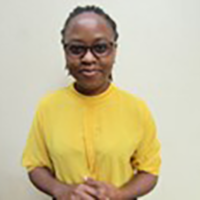
Jacquellyn Ssanyu, MPH
Jacquellyn Ssanyu is a pharmacist, public health professional, and research fellow working with Makerere University School of Public Health. She has experience in designing and implementing social and behavior change communication interventions, as well as leading and coordinating research projects. Prior to joining Makerere, she gained experience in clinical and community pharmacy settings in Uganda and Tanzania. Jacquellyn holds a Bachelor's degree in Pharmacy and a Master's degree in Public Health. She is currently pursuing a Ph.D. in Public Health jointly at Uppsala University, Sweden, and Makerere University, Uganda. Jacquellyn has actively worked on addressing vaccine misinformation. She has been involved in projects such as a Sabin Vaccine Institute-funded initiative, which applied dialogue-based social mobilization approaches to combat COVID-19 misinformation and vaccine hesitancy in rural Uganda. Additionally, she has contributed to the Cranky Uncle Project, which uses a mobile game involving cartoons and critical thinking to counteract misinformation. Currently, Jacquellyn is coordinating the Urban Thrive Project, which focuses on adapting high-impact practices in family planning, including social behavior change communication interventions. The project aims to enhance knowledge and understanding of family planning and strengthen family planning service delivery in urban areas of Eastern Uganda.
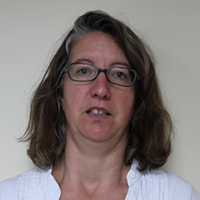
Claire Thomas
Claire Thomas is Co-Deputy Director of Minority Rights Group (International). Claire has a special interest in the power of disaggregated data (including data on ethnicity, language and religion) to improve policy and therefore increase inclusion of otherwise marginalised groups. She has consistently advocated for better investigations and understanding of how groups who face discrimination fare in accessing services. One methodology pioneered by MRG with her guidance, is the minority inclusion audit which reviews programmes post hoc for whether they reached ethnic, religious and linguistic communities equally/according to levels of need and if so, how and if not, why not. Claire’s work is not limited to vaccinations or even health in general but also covers access to all humanitarian and development services as there is considerable common ground and learning in data capture and analysis and policy reform across service type boundaries.
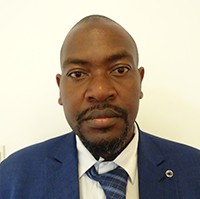
Mavuto Thomas, MPH
Mavuto Thomas is an innovative and impact-driven leader in Health Promotion with over 19 years’ field experience and training in strategic communications programming for promoting preventive health behaviors and demand creation for health services. He is Acting Deputy Director of Preventive Health Services responsible for Health Education Services in the Ministry of Health in Malawi. As part of his role as lead coordinator for health promotion and communication in the Ministry of Health, he oversees risk communication and community engagement activities on COVID-19 and other public health emergencies in Malawi as well as immunization. He is current Chairperson of the Public Health Risk Communication and Community Engagement Community of Practice for Africa (PH-RCCE-CoPA) steering committee formed by Africa CDC and WHO. He holds a Master of Public Health and Bachelor of Science in Environmental Health. He has attended and presented on a various national and international conferences on social and behavior change communications (SBCC) and health promotion.

Angus Thomson, PhD
Principal, Irimi. Adjunct Clinical Professor, Dept of Communication Studies & Global Health Communication Center, Indiana University School of Liberal Arts at IUPUI Angus Thomson is Principal of Irimi, an organization focused on building public trust in public health programs, with a particular focus on immunization. He is also Adjunct Clinical Professor, Department of Communication Studies & Global Health Communication Center, Indiana University School of Liberal Arts at IUPUI, USA. Angus was consultant Senior Social Scientist for the Demand for Immunization team at UNICEF HQ, and Dr. Thomson has conceived and helped build a number of global vaccine demand programs including the Vaccination Demand Observatory, the International Pediatrics Association Vaccine Trust Project, and an international collaboration which validated the use of context-driven vaccine messaging on online platforms. He co-authored the Vaccine Misinformation Management Field Guide (12,000+ downloads) and the Vaccine Messaging Guide, and previously led the Digital Information Environment workstream of the Vaccination Demand Hub. Angus also developed the AIMS mixed-learning behavior-centered IPC training program for Healthcare Professionals with Prof. John Parrish-Sprowl. He is a technical expert on vaccine demand and uptake and frequently speaks with the media, including CNN, the BBC and El Pais, on the subject.
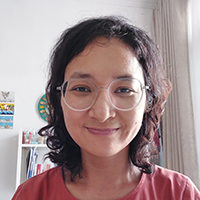
Frisca Tobing, MAAPD
Frisca Tobing has extensive experience in development both in research and managing projects. Currently, she is one of the Lead Researchers at EMPATIKA. She has also been involved in various mixed-methods studies across Indonesia and is skilled in employing qualitative and participatory research studies. Some of her recent works have focused on people's behaviour related to COVID-19 vaccine and preventive measures; lead poisoning and pollution; and accessing malaria services. Frisca holds a Master's degree in Applied Anthropology and Participatory Development from Australia National University. Her prior work includes research related to gender, forests, and managing research projects.
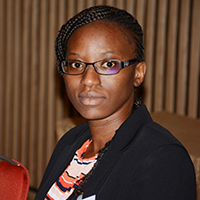
Carla Toko, MPH
Carla Toko has worked on multiple aspects of immunization programs, including community mobilization efforts to increase demand for immunization services, advocacy for sustainable domestic financing, and technical support for surveillance activities of vaccine-preventable diseases. In 2020, Carla joined VillageReach DRC as Advocacy & Communications Manager. She previously was at SANRU Asbl, a local NGO in DRC, as a behavior change communication specialist where her work mainly focused on community mobilization and community-based disease surveillance through partnerships with local organizations, covering health topics such as immunization, maternal newborn child adolescent health (MNCAH). She also oversaw SANRU’s response in providing a hotline during the 2018 Ebola outbreak in the Equateur province in DRC. Prior to that, Carla was a Polio C4D consultant in Cote d’ Ivoire.
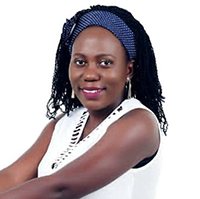
Doreen Tuhebwe, MPH, PhDc
Doreen Tuhebwe is a Research Fellow at Makerere University School of Public Health (MakSPH). She holds a Bachelor’s Degree in Environmental Health Sciences, and a Masters of Public Health from Makerere University. She has participated and led in teaching, examination, research, and community service at MakSPH. For five years (2015-2020) she steered the MakSPH graduate students’ mentorship program-a platform aimed at supporting students as they journey through graduate training. She also has experience in implementation of research and service projects, writing research protocols, monitoring field work/ experiments and conducting ethnography studies with over 20 publications in peer reviewed journals. Doreen has written grants and led her own research through small grants programs. She is a founder member of Women in Global Health- Uganda Chapter and the MakSPH-Master of Public Health Alumni Association. Doreen has interest in global health, adolescent reproductive health and autonomy, disease control including HIV/AIDS and neglected tropical diseases and models of service delivery for vulnerable populations in urban poor settings, cross borders, and fishing communities. She is currently pursuing a PhD in Public Health-Global Health at San Diego State University, USA.
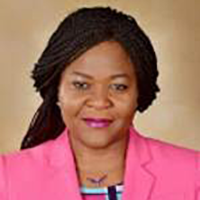
Chizoba Wonodi, DrPH
Dr. Chizoba Wonodi is public health physician with over twenty-seven years’ research and program experience in Africa, Asia and America. She serves as the Nigeria Country Director at the International Vaccine Access Centre (IVAC). In this role, she leads an important portfolio of work on technical assistance, implementation research and policy advocacy to improve immunization service delivery and primary health care systems in the country. She is currently the principal investigator for a Gates Foundation-funded project to improve immunization uptake by sending SMS messages to inform, educate and remind caregivers of their child’s vaccinations. Implemented as a cluster randomized trial, this intervention – the Immunization Reminder and Information SMS System – is intentionally large in scope to demonstrate how innovations like SMS reminders can be taken to scale. In keeping with her focus on public health practice, Dr. Wonodi founded the Women Advocates for Vaccine Access (WAVA), a coalition of Civil Society Organizations in Nigeria advocating for increased uptake of vaccines and for sustainable financing of immunization programs. WAVA serves as the secretariat for the national platform, the Expanded Civil Society Initiative for Immunization (ECSII) in Nigeria. At the global level, Dr. Wonodi holds the vice chair position of the Gavi CSO Platform Steering Committee, a body that coordinates Civil Societies active in immunization.
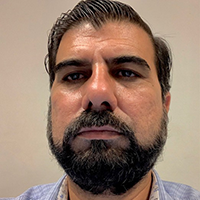
Tahir Yousafzai, PhD, MPH
Tahir Yousafzai, PhD, MPH (Global Health) is working as an Assistant Professor at the Department of Pediatrics and Child Health, Aga Khan University in Karachi, Pakistan. Tahir has more than 10 years of research experience in Pakistan, the Middle East and Australia. His research interests range from surveillance of vaccine-preventable diseases among children, to impact evaluation of newly introduced pediatric vaccines and vaccine hesitancy. He recently completed a funded study exploring the misinformation regarding the COVID-19 pandemic and COVID-19 vaccines and used co-design methodology to develop contextual strategies to address misinformation among the marginalized communities living in peri-urban settlements in Karachi. In addition, Tahir is a co-investigator on a Coalition for Epidemic Preparedness Innovations (CEPI) funded multicenter phase 2 trial evaluating the immunogenicity and safety of various COVID-19 vaccines administered through a mix-and-match strategy in Pakistan. He is also a co-Principal Investigator for a GAVI-funded project to evaluate the impact of a typhoid conjugate vaccine among children in several cities within Pakistan.
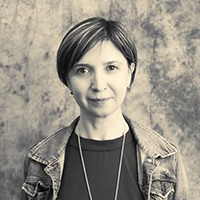
Raluca Zaharia
Raluca Zaharia is a communication specialist with 27 years of experience. For the past 18 years she has been working with UNICEF in Romania, specializing in in social and behaviour change (SBC). She is a graduate of the communication for development programme of Ohio University and UNICEF. She has worked both in local, regional and global development programmes and in humanitarian interventions. She has developed and implemented SBC programmes addressing violence against children, risk behaviours in adolescents and social cohesion. In the past seven years, her work has focused on building and maintaining demand for immunization, communicating with caregivers and building the capacity of the health system to create a favourable environment to increase vaccine acceptance.
